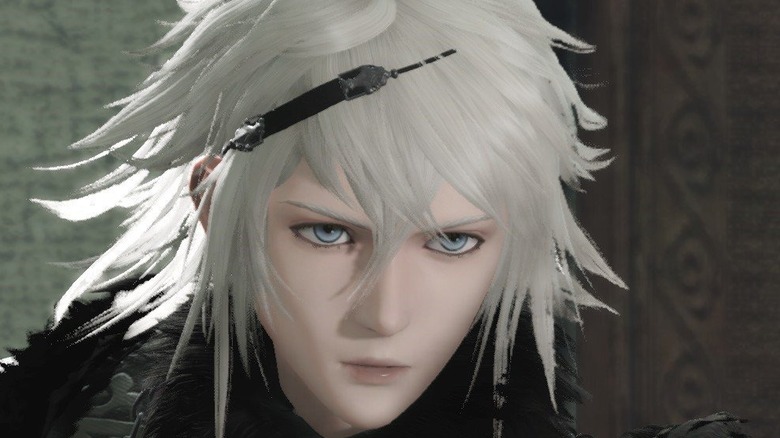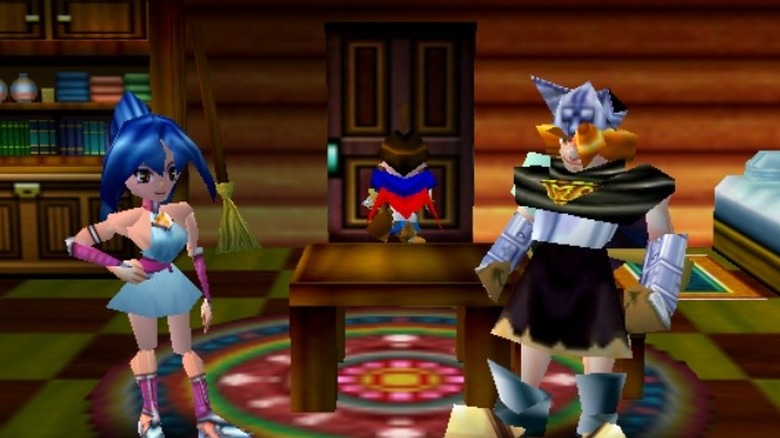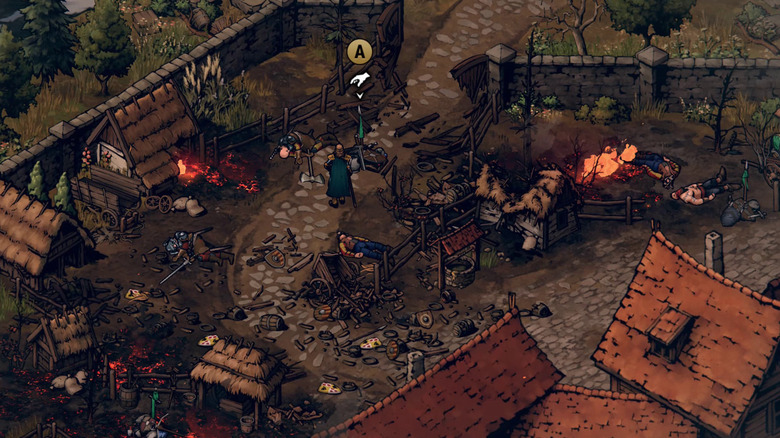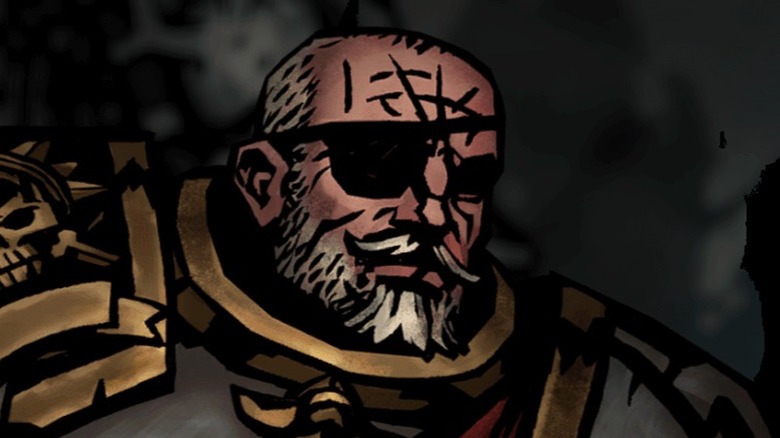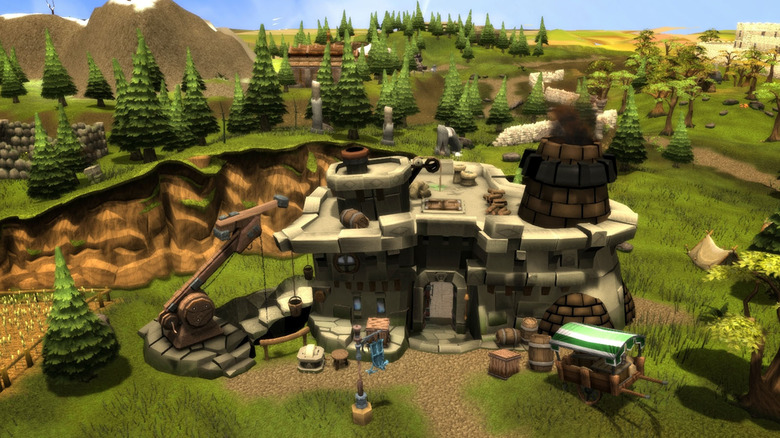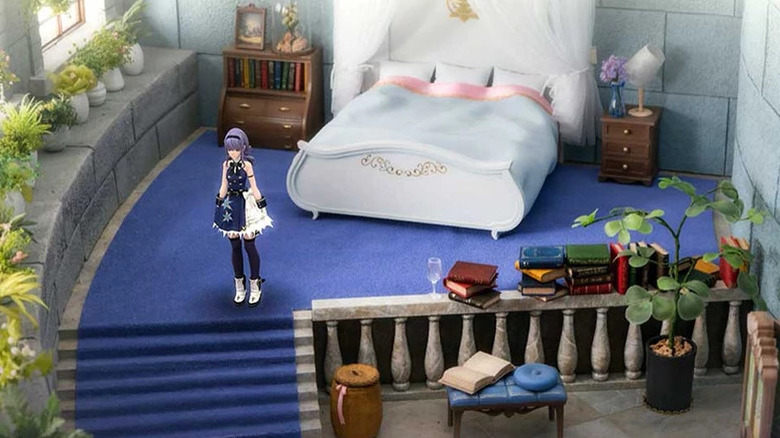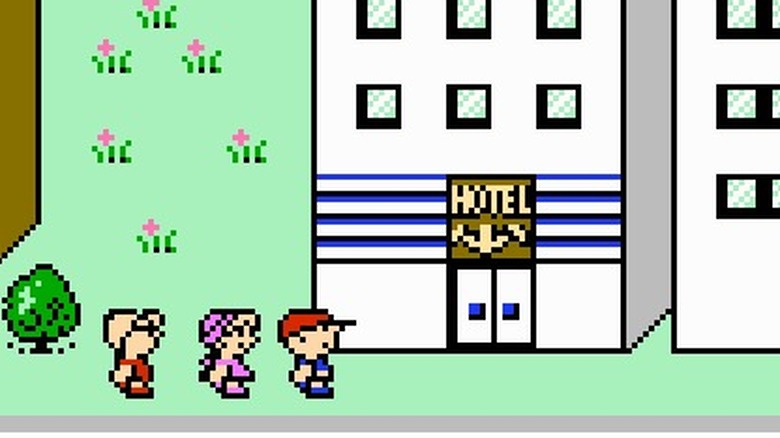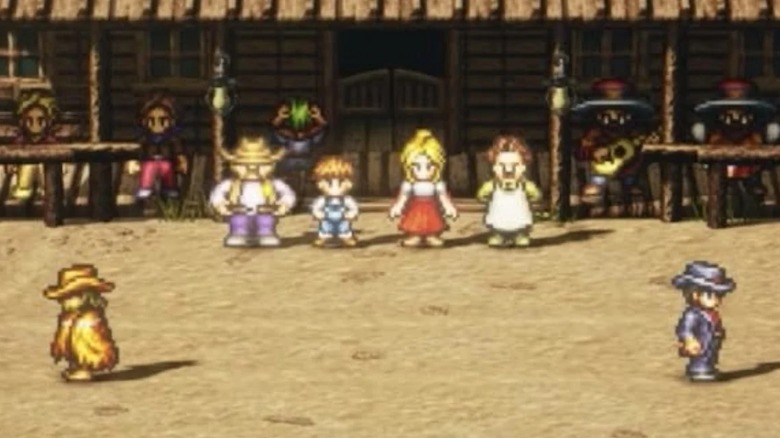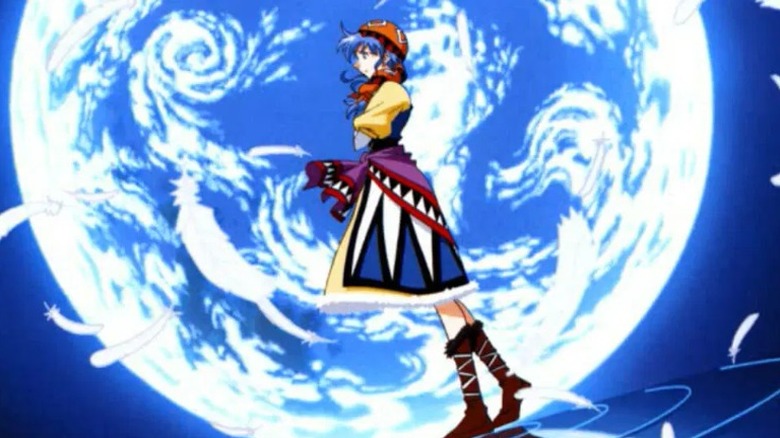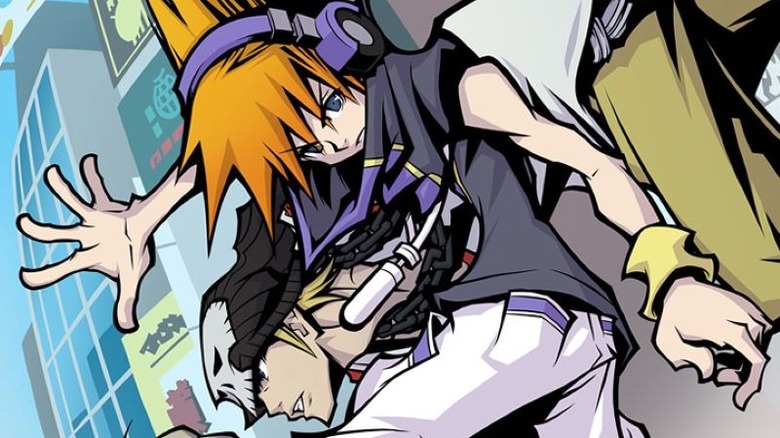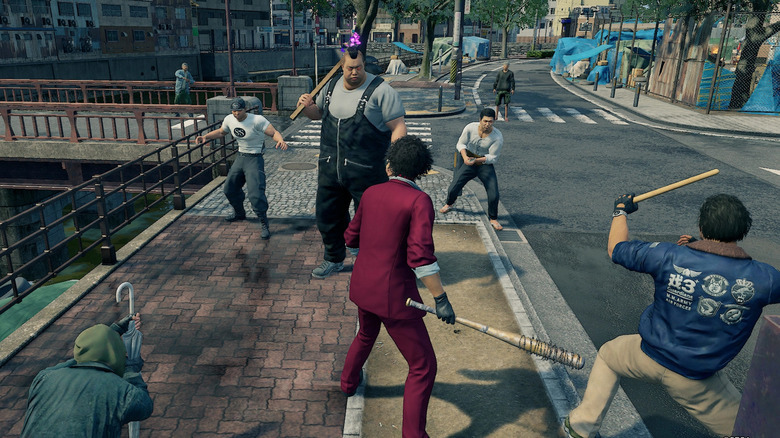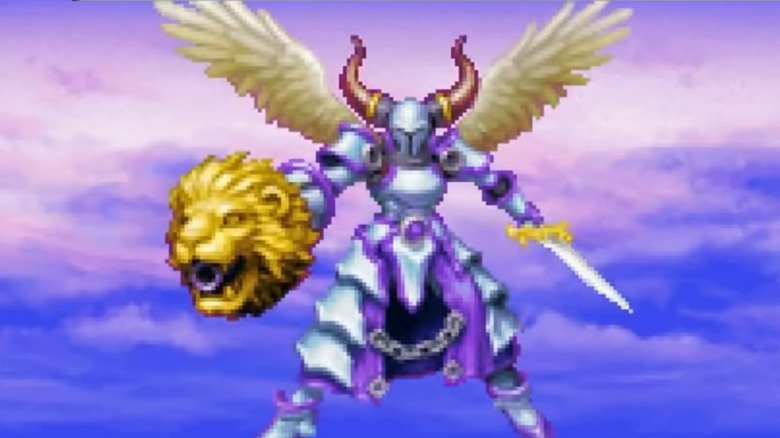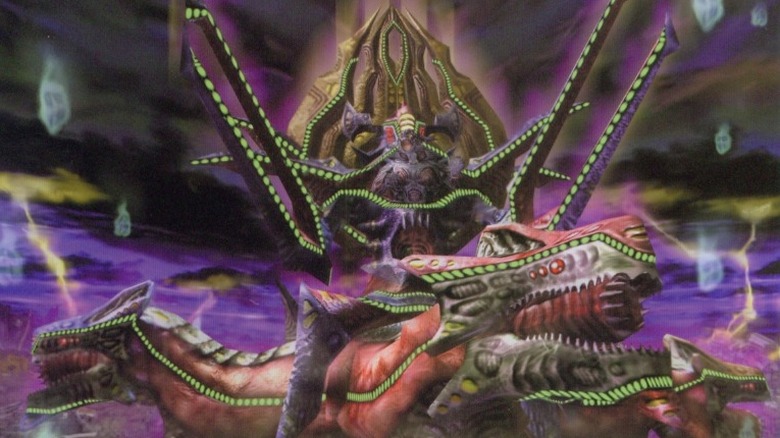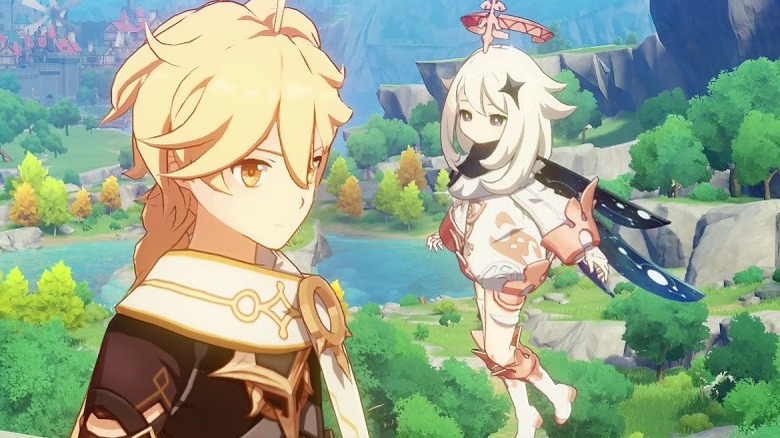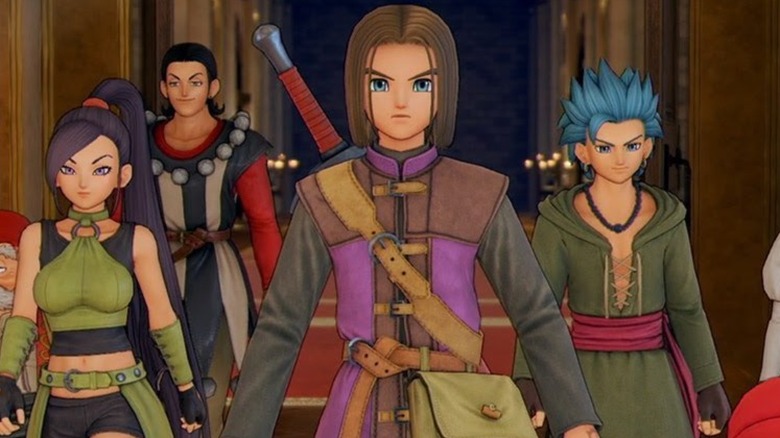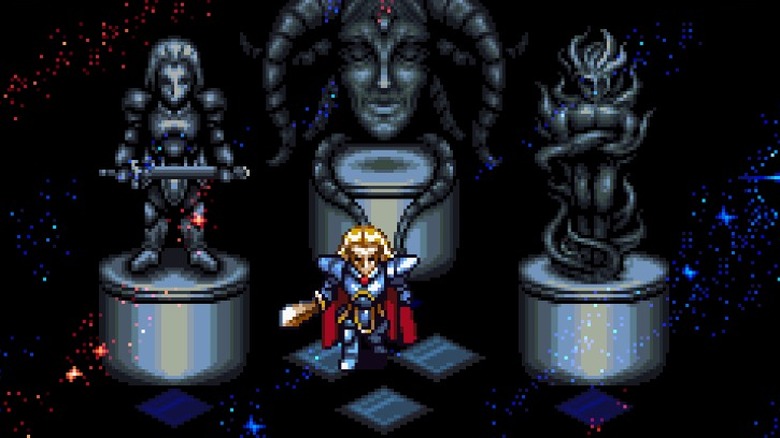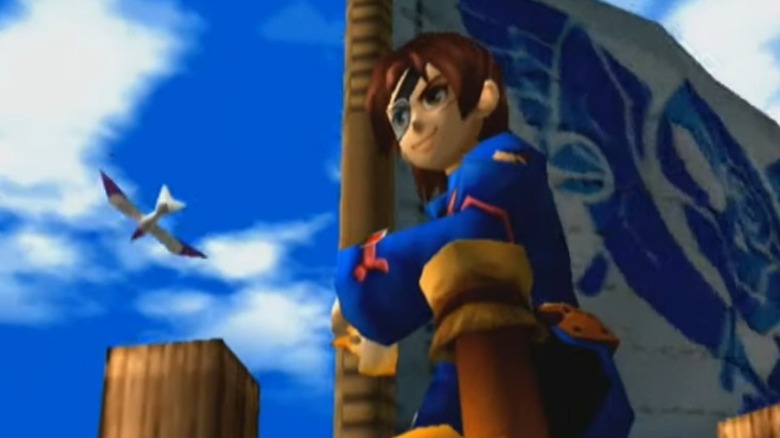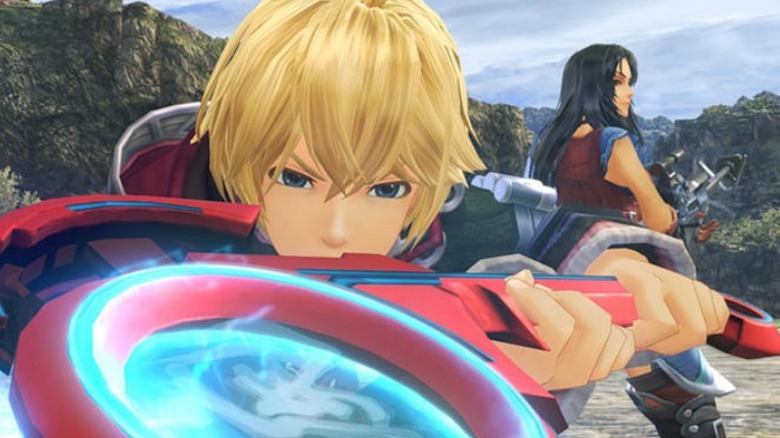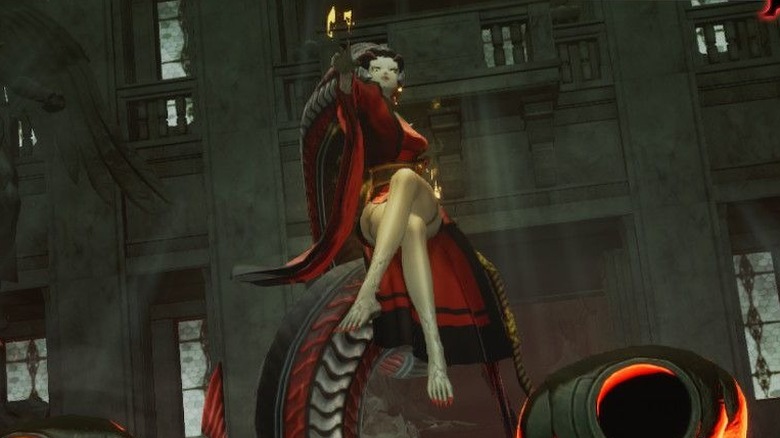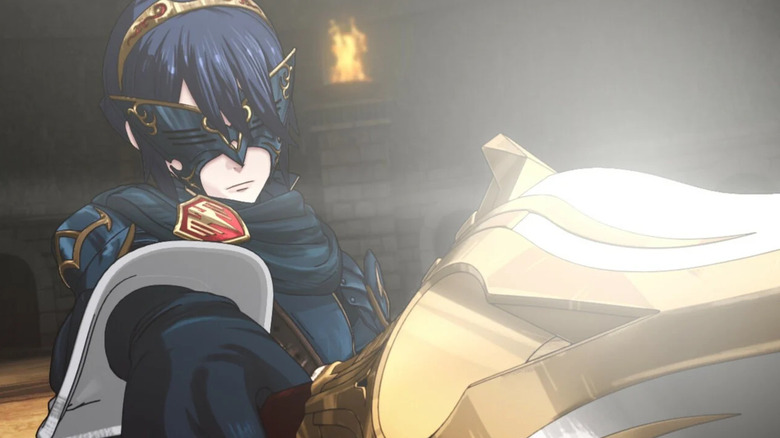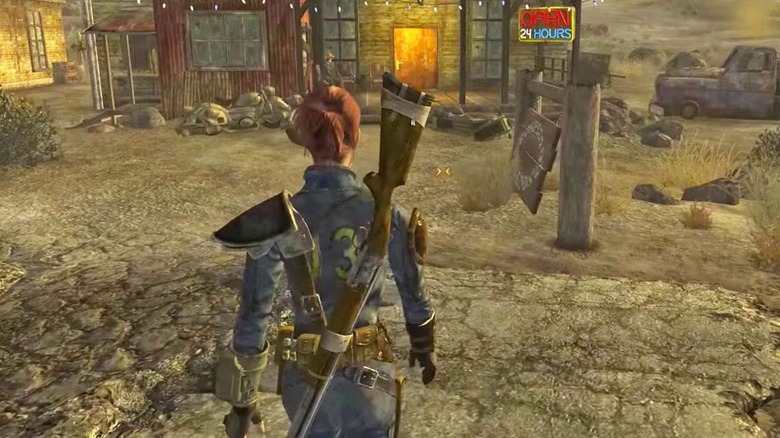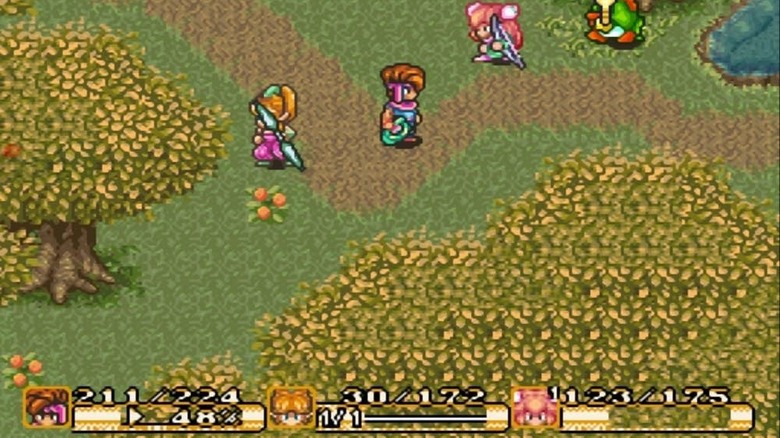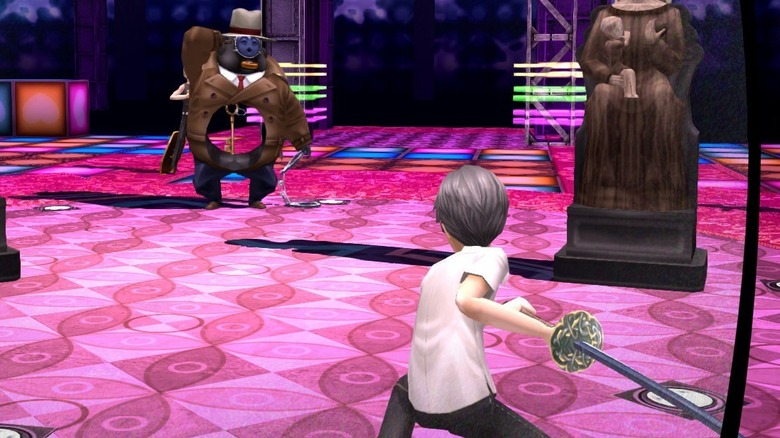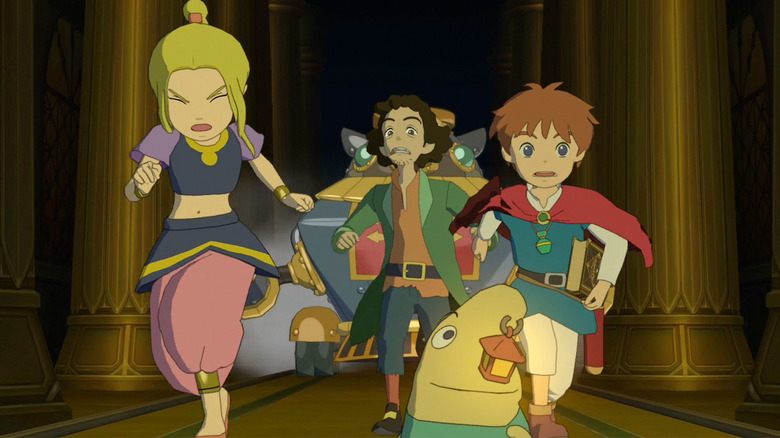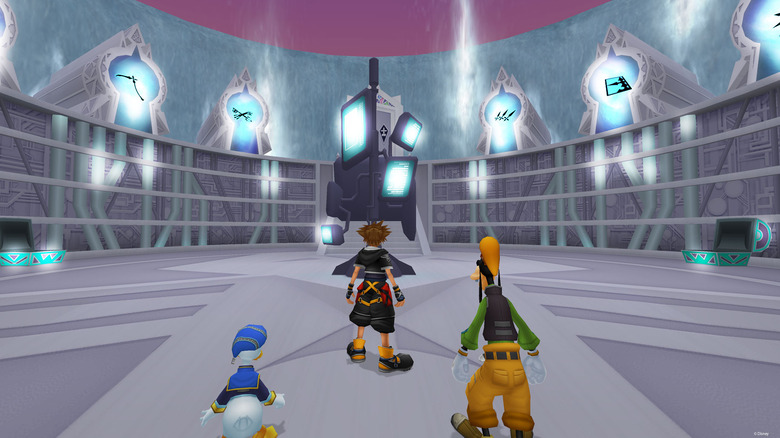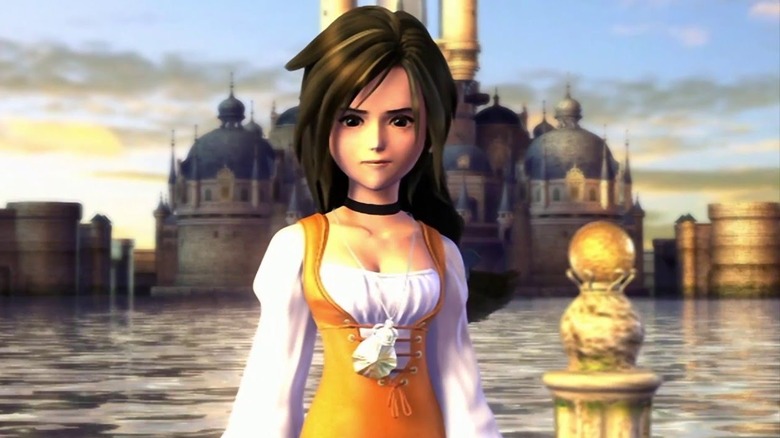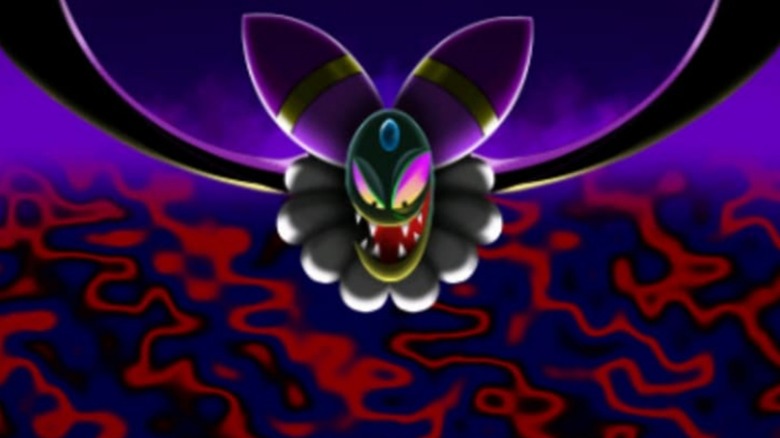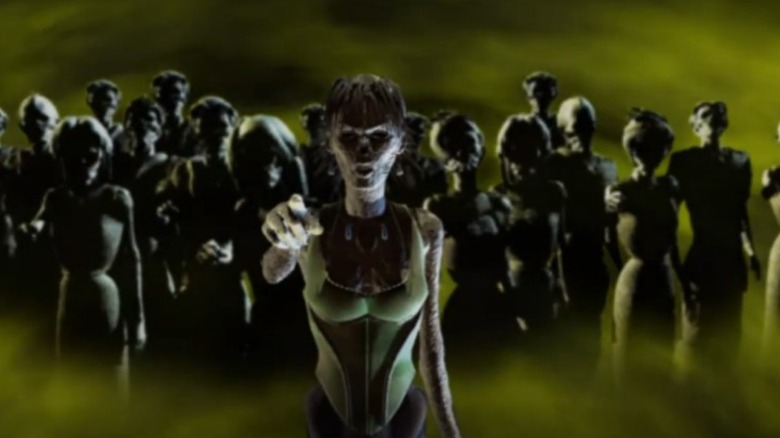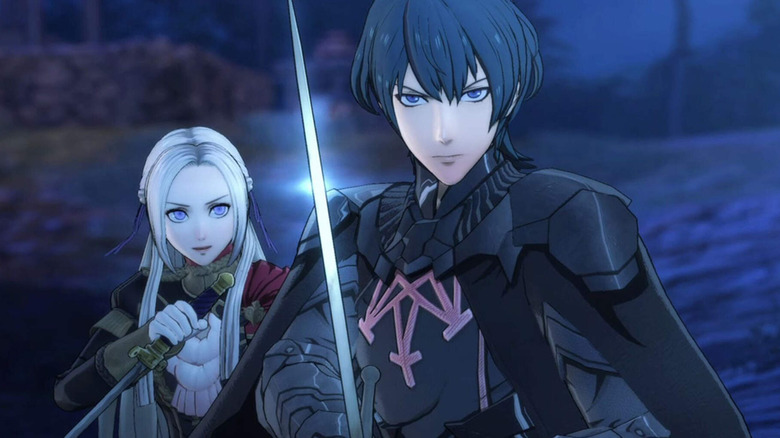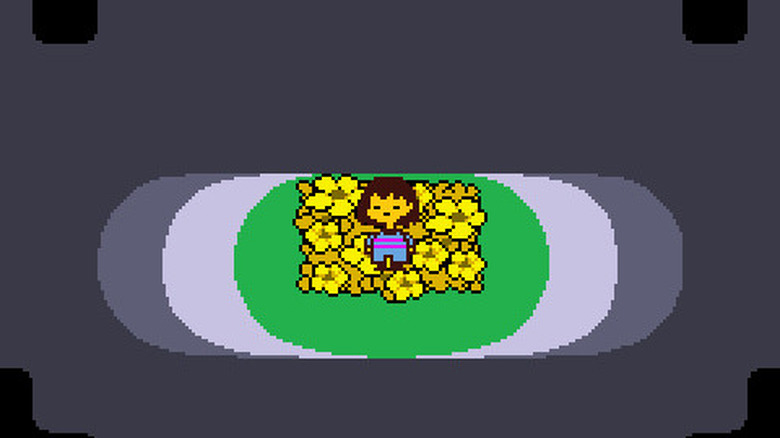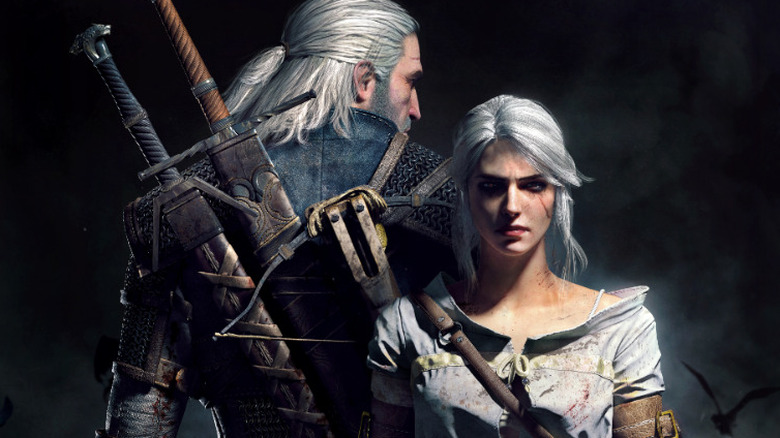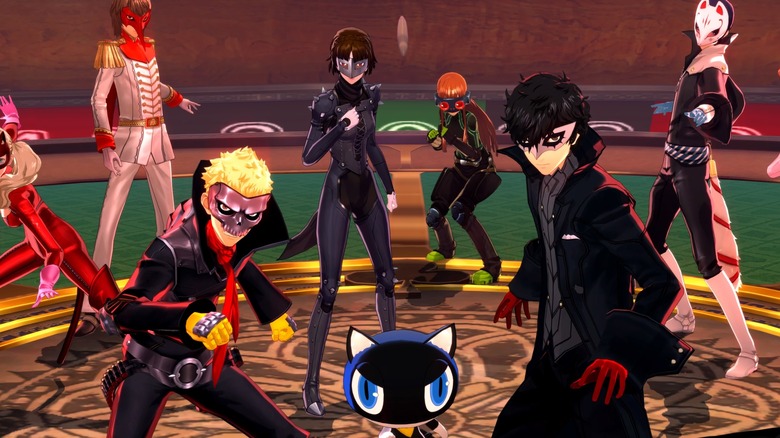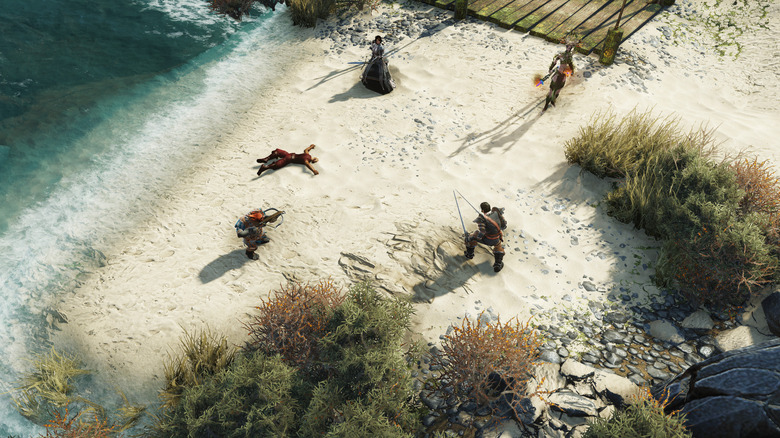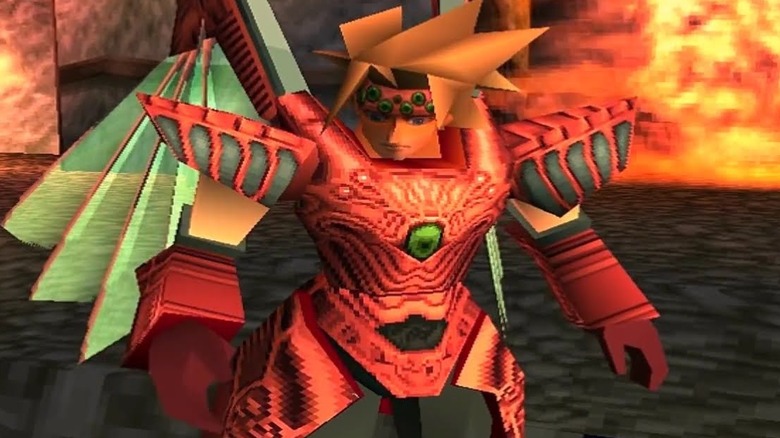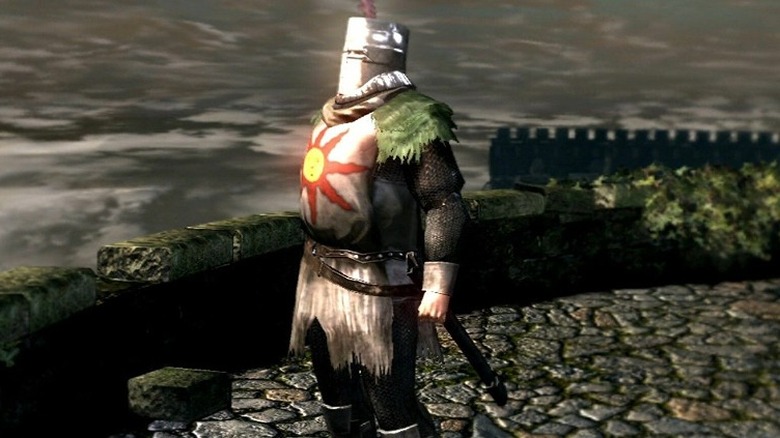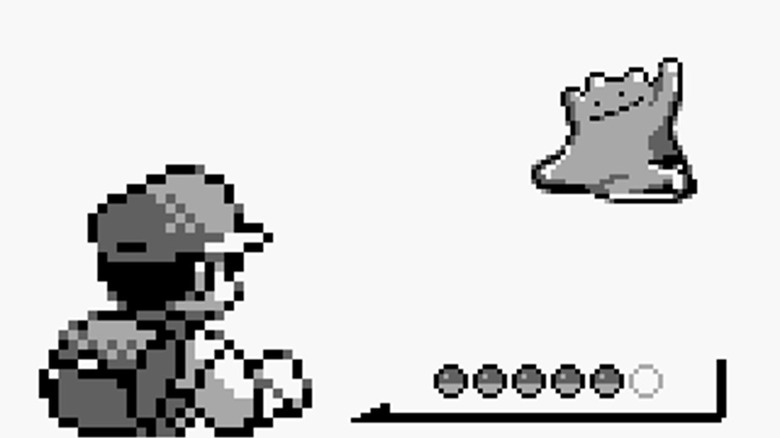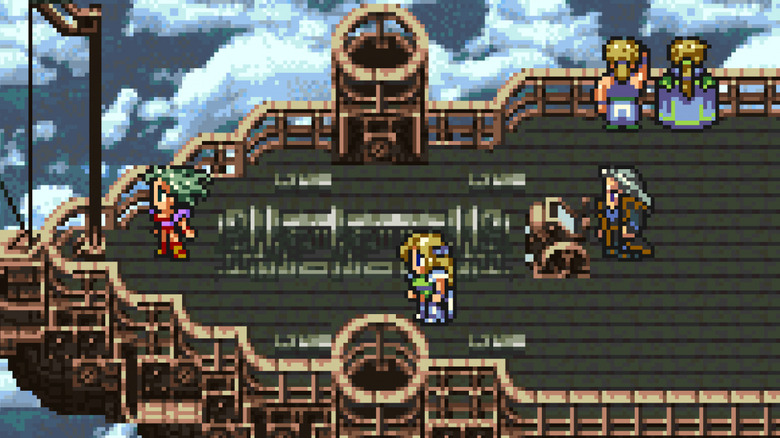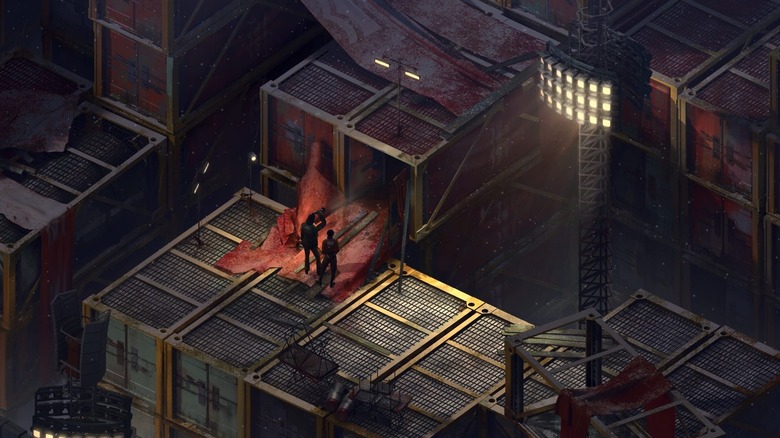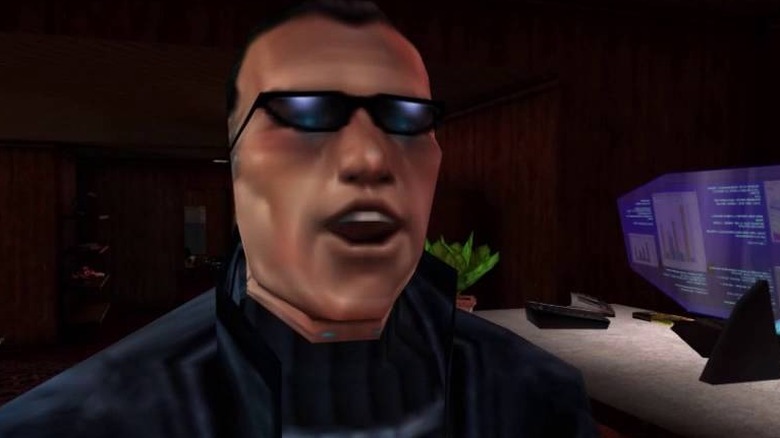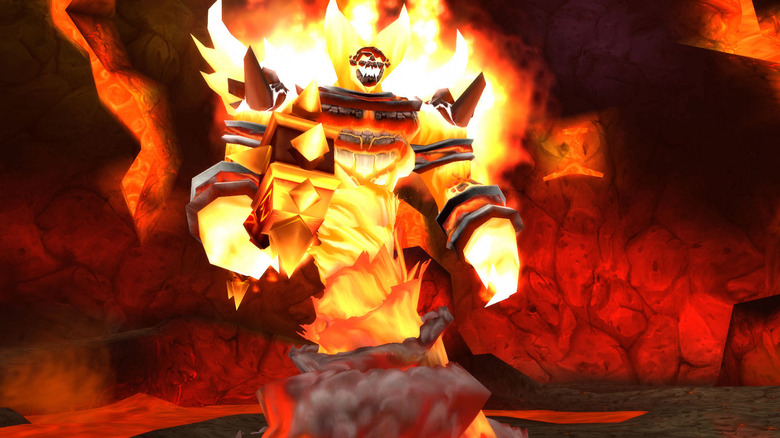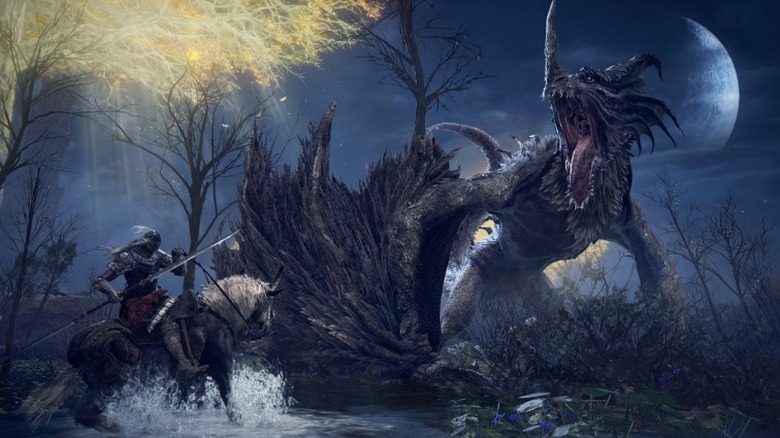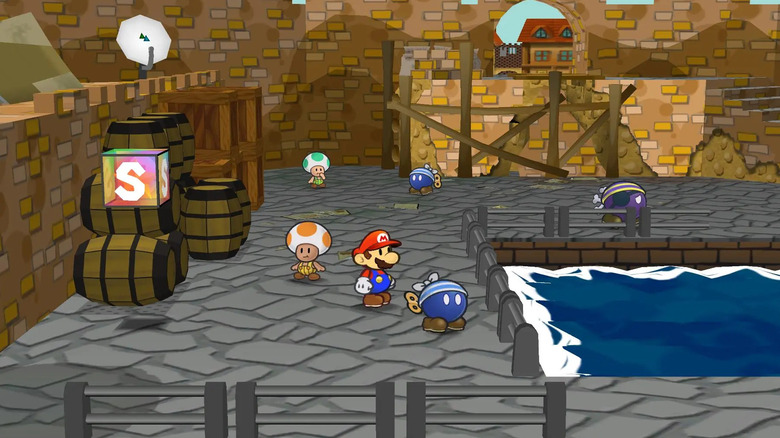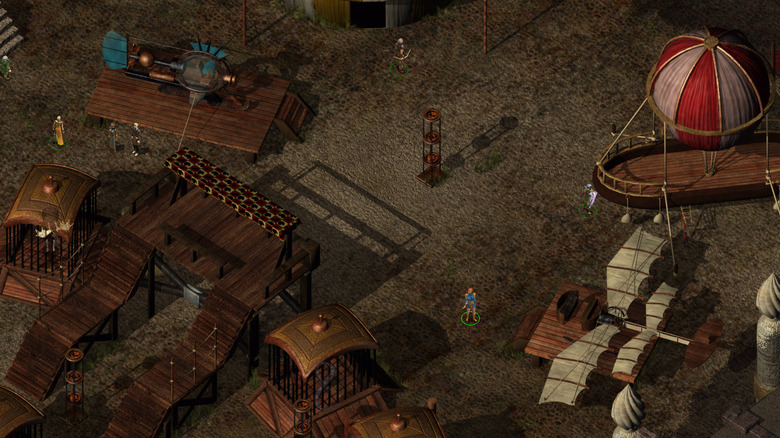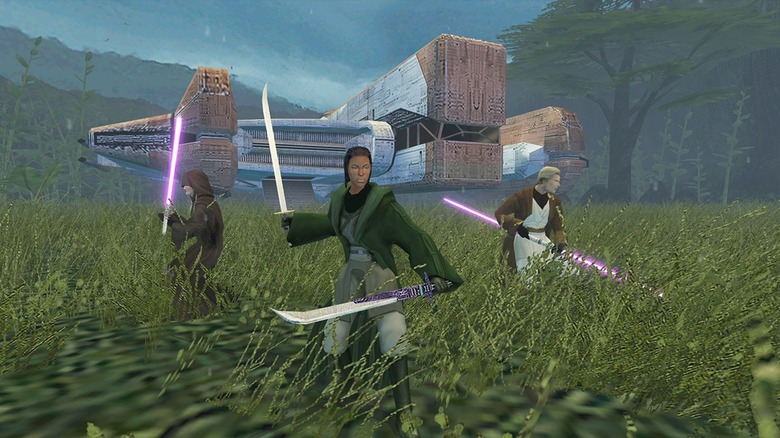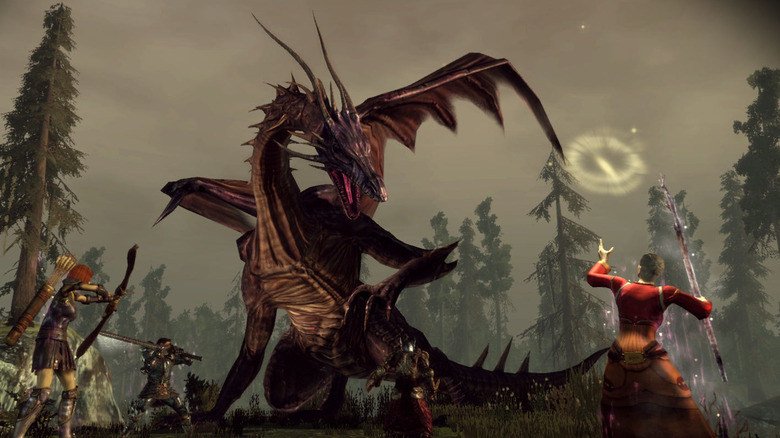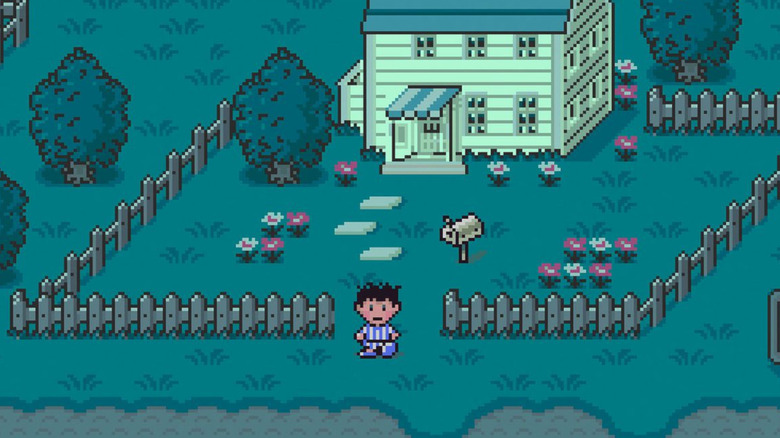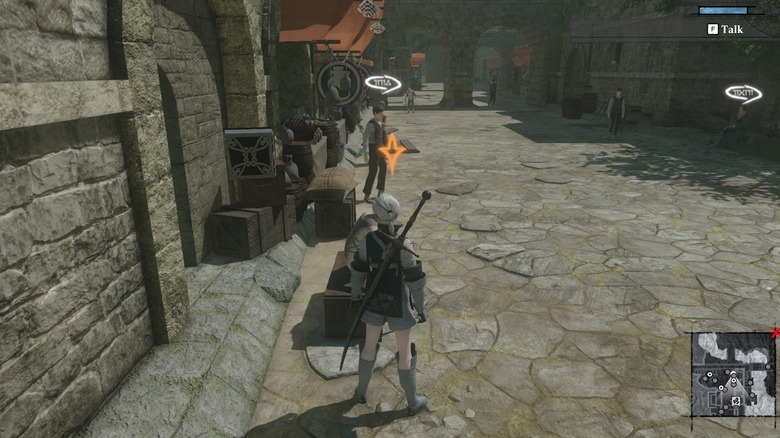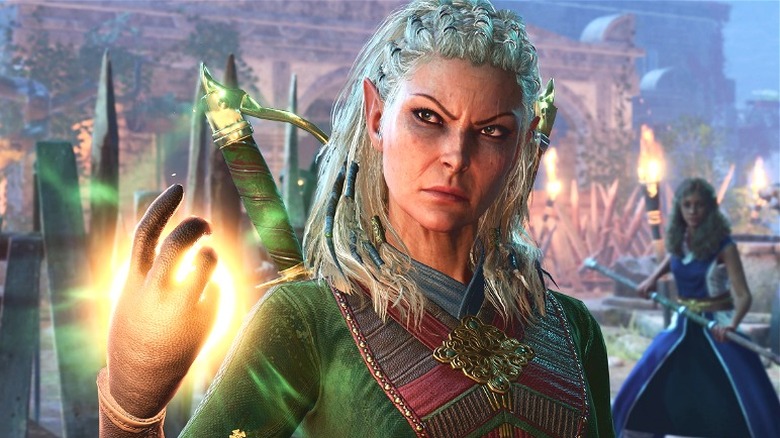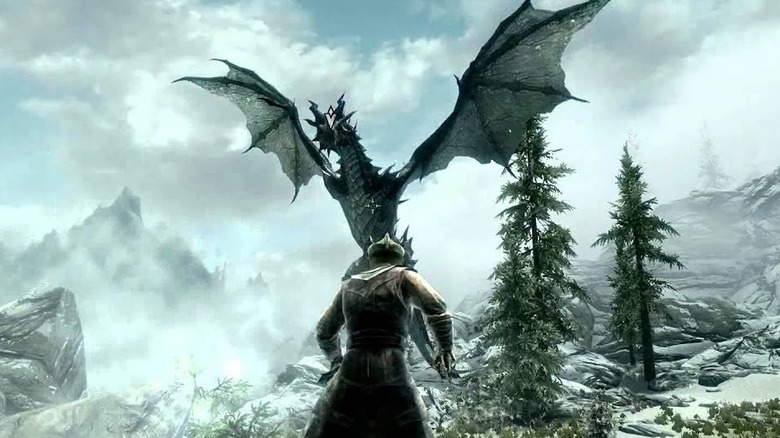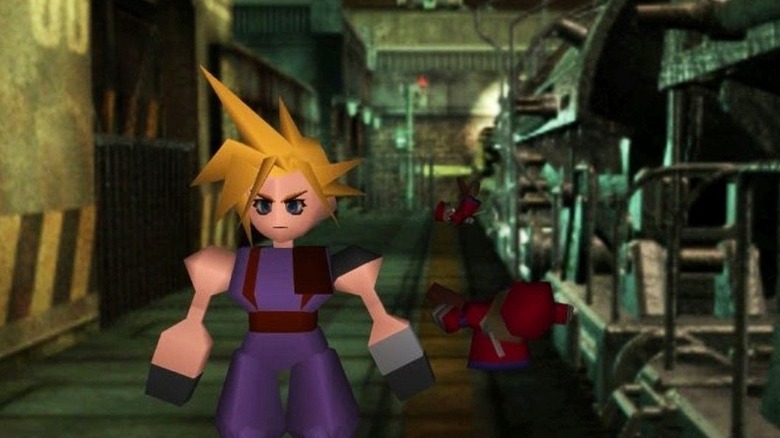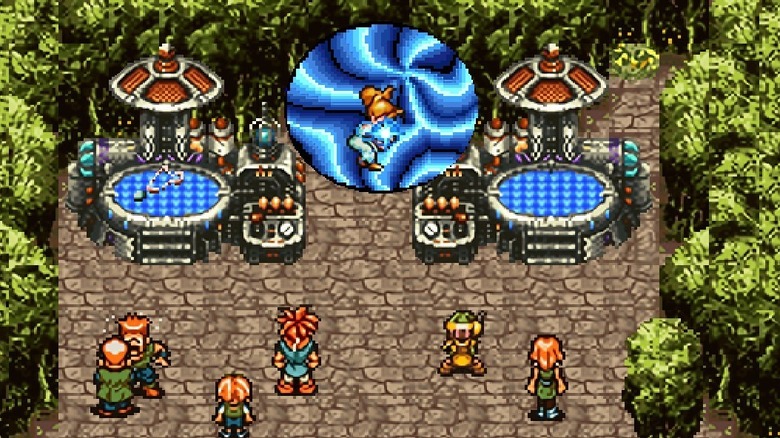The 50 Best RPGs Of All Time Ranked
Role-playing titles represent unique opportunities, even within the expansive world of video games. RPGs allow gamers to step into the shoes of a new character — often one that is customized to the player's exact specifications — and journey through immersive stories. Some RPGs are more in-depth than others, of course, and the genre has continually grown over many years to include all manner of sub-genres. But even some of the less advanced RPGs were crafted with ingenuity and care.
But while RPG games may differ in terms of setting, difficulty, and level of detail, they all offer gamers an opportunity to play a defined role within a tightly constructed fantasy. RPGs have the power to truly transport players to another place. The following games represent the very best the genre has to offer, from high-flying battles for the fate of humanity to comedic romps through the underbelly of society. Here is a ranking of the 50 best RPGs of all time.
50. Quest 64
Unlike some of the other games on this list, Nintendo 64 titles haven't aged all that gracefully. The polygonal graphics that seemed cutting edge in the 90s feel clunky compared to what current-gen systems can do. The Nintendo 64, while it had plenty of gems, was also light on RPGs. That being said, "Quest 64" stands out as being the first RPG for the system, which makes it an interesting piece of history. It's also incredibly light and easy to pick up. There's no complicated plot to remember, no difficult battle system, just a boy named Brian on the hunt for his father's magical tome. Combat in "Quest 64" takes place in real-time, which was considerably forward thinking compared to other RPGs on the market. In that way, "Quest 64" feels like some contemporary RPGs, like "Final Fantasy 7 Remake."
When it was released in 1998, IGN praised "Quest 64," though reviewer Peer Schneider also found some flaws with it. Overall, the game delivered on bringing an RPG to the Nintendo 64, and even if the plot could've used more surprises, it was overall a fun title. Now, "Quest 64" stands out as both an interesting piece of history and a look back at the more earnest RPGs of the past.
- Release Date: June 1, 1998
- Genre: RPG
- Game modes: Single-Player
- Metacritic Score: N/A
49. Thronebreaker: The Witcher Tales
"The Witcher 3" has been a favorite among RPG fans since its release in 2015, but its magnificent spinoff, "Thronebreaker: The Witcher Tales," isn't always given the same love. Conceived as a single-player campaign for CD Projekt Red's online game "GWENT: The Witcher Card Game," "Thronebreaker: The Witcher Tales" tells the story of Meve, Queen of Rivia and Lyria, on her quest to push back the Nilfgaardian forces and reclaim her crown.
"The Witcher 3" and its two predecessors take place several years after the books with which they share a name, but "Thronebreaker" is set right in the middle of the events of the books. Instead of directly adapting any of the stories written by Andrzej Sapkowski, "Thronebreaker" focuses on a secondary character with a small but impactful role, Queen Meve. Meve's character is built out stunningly in "Thronebreaker," and the game acts as a major expansion to the world of "The Witcher." In addition to painting a picture of the franchise's past for fans who aren't familiar with the books, it also serves as a meaningful way for the book's fans to spend more time with a less-prominent character.
Beyond all that, "Thronebreaker: The Witcher Tales" is also extremely fun. Gwent is a lovely little mini-game diversion in "The Witcher 3," and the online adaptation, "Gwent: A Witcher Card Game" has been fleshing out the mechanics for six years. "Thronebreaker" uses the updated rules and UI from the online game, allowing for plenty of surprisingly engaging and exciting card-based combat encounters.
48. Darkest Dungeon
Few gamers have beaten "Darkest Dungeon," but that doesn't mean players shouldn't start on the journey. This incredibly difficult, deceptively terrifying, eldritch horror of a game has entranced many players since it first released in 2016, but what makes it stand out in a sea of RPGs? "Darkest Dungeon" puts players in charge of assembling a mighty crew of adventurers, each of whom has their own special skillset. Players must then lead that group into the dark, mysterious labyrinth beneath a strange manor, hoping to find treasure, but also save the world in the process. The dungeons that lie under the mansion are procedurally generated, so players are kept on their metaphorical toes on each and every run. As players progress farther in the game's story, things start to seem a bit strange in town as well, and madness is around each corner.
Polygon's review of "Darkest Dungeon" boasts that the game will make players question their own sanity, both with its difficulty and eerie aesthetics. The ambiance alone makes "Darkest Dungeon" worth checking out.
47. RuneScape
As an older game with a massive playerbase, "RuneScape" has led the MMORPG category alongside "World of Warcraft" for years and years. Part of the mass appeal of "RuneScape" is its accessibility; all players need to play is an internet connection to run the in-browser Java client. There's no subscription fee or required upfront cost, so the realms of Gielinor have very low barriers to entry. Consequently, the game's success led it to be, at one point, the most played free MMORPG of all time, as well as being the most updated MMORPG of all time.
In terms of innovation, "RuneScape" does not lag behind. Where many RPGs and MMORPGs follow a central questline to anchor player progression and story dynamics, "RuneScape" goes in the other direction, allowing the player to explore the wide open world on their own terms. And the custom progression mechanics fully support the non-linear story by being non-linear themself. Between a healthy balance of combat, gathering, and crafting skills, there is enough content for players to go in whatever direction they choose. An obsessive dedication to completionism has led legendary players like Zezima to max out to every category to skill level 100. The incredibly dedicated "RuneScape" community is probably the largest driving factor for its continued relevancy. When everyone on the game's servers can still reminisce about community events from decades ago, then it's pretty clear that "RuneScape" still stands as one of the most important RPGs of all time.
- Release Date: Jan. 4, 2001
- Genre: Multiplayer Massive Multiplayer Online Role Playing Game (MMORPG)
- Game modes: Multiplayer
- Metacritic Score: 86 (PC)
46. Fantasian
"Fantasian" is "Final Fantasy" creator Hironobu Sakaguchi's true "final fantasy" — his final game. He founded Mistwalker, the studio that developed "Fantasian," and also personally worked as a producer and writer for the game. Unlike Square Enix, Mistwalker tends to focus on mobile games. Still, "Fantasian" should feel familiar to "Final Fantasy" fans. Its story has two parts: one that released in April 2021 and another that released in August 2021. Leo, the amnesiac protagonist, fights through the game with the help of new comrades to find the truth behind his missing memories. The game's Dimengeon system lets players pick when to face enemies, sometimes at the expense of facing many at a time instead of separate encounters. It also incorporates 3D "dioramas" scanned into the game from real-life, giving its sets a realistic, renaissance-like style.
"I loved 'Fantasian,' even if parts of its story might've stumbled," wrote RPG Site's James Galizio. "Its inventive combat and boss fights gripped me, while the characters and the overall message behind the story did manage to leave an impact." Many critics agreed, also pointing out the title's unforgiving bosses. It's no wonder "Fantasian" earned the title of RPG Site's RPG of the Year in 2021. At the moment, the game is only available on iOS via Apple Arcade, so only those with Apple devices can enjoy it.
- Release Date: April 2, 2021
- Genre: RPG
- Game Modes: Single-Player
- Metacritic Score: 80 (iOS)
45. Mother/Earthbound Beginnings
The first installment in a popular franchise can oftentimes feel like a prototype for things to come. The groundwork is there, but when revisiting the game, it's easy to see the cracks that later entries would fill in. Not so with "Mother." You could play and replay "Earthbound" and "Mother 3" dozens of times and "Mother" would still be a delight to return to. As a matter of fact, most American fans of the series wouldn't play the original "Mother" until 2015, more than 25 years after its original release, when it made its way to the Wii U under the title "Earthbound Beginnings."
Thankfully, age has been kind to "Mother." Even now, the quirky writing will elicit a chuckle from even the most coldhearted, cynical RPG fan. No matter how many games build on and borrow from this Famicom classic, it remains a delightfully singular experience. While there's no legal way to play the original release in English, the localized "Earthbound Beginnings" edition is available on Wii U and Nintendo Switch, and it's a very worthwhile use of your time. The game's offbeat humor and zany vibes set it apart from many JRPGs of the era, and decades after its release, that same unique energy makes it easier to return to and enjoy than many games of its time. "Mother" has spawned two sequels and countless imitators, but the original is still wholly worth your attention.
- Release Date: July 27, 1989
- Genre: RPG
- Game modes: Single-Player
- Metacritic Score: N/A
44. Live a Live
In some ways, "Live A Live" was ahead of its time, paving the way for other iconic RPGs to emerge. Directed by Takashi Tokita – who would later go on to direct "Chrono Trigger" and "Parasite Eve," among other games – crafted a complex world of interwoven stories. Players could choose from a selection of 7 characters, each of whom encounters a mysterious enemy that seeks to destroy the world. After completing all of the characters' stories, a new chapter opens, revealing how each tale ties together. The concept of shared experiences across time, as well as the deeply human desire to connect with others in a common goal, makes "Live A Live" a must-play for anyone interested in the long history of RPGs.
Though "Live A Live" was a Japanese exclusive when it first released in 1994, a complete remake was released for the Nintendo Switch in 2022, bringing the game to a whole new generation of gamers. The remake updates the visuals of "Live A Live" to a 2D/3D hybrid style similar to "Octopath Traveler."
- Release Date: Sept. 2, 1994
- Genre: Turn-based RPG
- Game modes: Single-Player
- Metacritic Score: N/A
43. Lunar: Silver Star Story Complete
"Lunar: Silver Star Story Complete" is actually a remake of the 1992 RPG "Lunar: Silver Star Story," and it's a total upgrade from the original that introduced the classic to a new group of gamers. With stunning anime cutscenes and a beautiful soundtrack, "Lunar: Silver Star Story Complete" features a fairly straightforward story. A young boy named Alex wants to become a great adventurer and do good for the people of his world. So, like any ambitious young man, he sets off to explore a cave, only to meet a dragon who encourages Alex to become a Dragonmaster. Alex and his friends then set out to see the world and get stronger, finding out about themselves along the way.
Now, "Lunar: Silver Star Story Complete" might not feel as revolutionary as it did upon its release, but that doesn't mean that gamers should pass over it. EGM's Aidan Moher wrote that above all else, "Lunar" is "sincere," and that the spirit of the game is incredibly earnest and bright. That sort of optimism and simplicity is something that gamers long for even now.
- Release Date: May 28, 1999
- Genre: Turn-based RPG
- Game modes: Single-player
- Metacritic Score: 78 (PS1)
42. The World Ends With You
When it first came out in 2008, "The World Ends With You" earned the status of a cult classic. It was overshadowed by Square Enix's massive successes in "Final Fantasy" and "Kingdom Hearts," but those who did pick it up were largely drawn in by its unique (if hectic) gameplay and coming-of-age storyline. Neku, the antisocial protagonist, finds himself stuck in an alternate version of Shibuya, Tokyo's fashion district. He must team with others to fight against monsters called Noise in a weekly "game" to have any hope of escape. These fights are full of stylish combat. "'The World Ends With You' is an amazing marriage of style and gameplay. The dual screen combat further stretches what the DS can achieve in gaming that is far from a lame gimmick," GameSpot's review read.
Since its release, "The World Ends With You" has received multiple ports and remasters, including "The World Ends With You: Solo Remix" and "The World Ends With You: Final Remix." The former also includes "Another Day," which is a canon side story that acts as an bridge between the first game and the sequel, "NEO: The World Ends With You." The sequel arguably earned more attention than its predecessor, especially since an anime adaptation came out around the same time. Still, nothing can top the meaningful character arcs and themes from the original.
41. Yakuza: Like A Dragon
It's rare for a sries to pull off a total change in genre. This especially rings true when a series has remained consistent in its identity for so long. That's why it was surprising when "Yakuza: Like a Dragon" was revealed to be a turn-based RPG; a far-cry from the franchise's iconic beat 'em up style. Somehow Studio Ryu Ga Gotoku was able to pull off the impossible by creating a tight JRPG.
The first mainline game without Kazuma Kiryu as the main protagonist, "Like A Dragon" instead puts Ichiban Kasuga at the forefront. Funny enough, Ichiban is a fan of "Dragon Quest," so the traditional JRPG-style gameplay is therefore fitting. "Like A Dragon" includes all the makings of a typical JRPG, including a growing party, turn-based command moves, and an in-depth job system. Every added member has their own quirks that can be customized to fit a different role in the party, while attainable jobs range from a chef to breakdancer. "Like A Dragon" also retains the best aspects of the franchise. Side quests, mini games, and fight encounters are ever-present. The game's open world is limited in scale, but surprisingly dense.
- Release Date: July 14, 2020
- Available On: PC, PS5, PS4, Xbox Series X, Xbox One
- Game modes: Single-player
- Metacritic Score: 83 (PC), 86 (PS5), 83 (Xbox Series X), 89 (Xbox One)
40. Golden Sun/Golden Sun: The Lost Age
The Game Boy Advance didn't have many notable RPGs, and most were ports of older titles or relied on existing IPs. "Golden Sun" was one of the only exceptions, but it stood apart from the rest and shone like, well, a golden sun. "Golden Sun" was a beloved series about children with elemental powers trying to prevent the return of the titular Golden Sun, a powerful force that could destroy the world. The story isn't anything new, but the game's combat system is a thing of beauty. "Golden Sun" is mostly classic turn-based battles at its finest, but the game's secret ingredient is Djinn. Equipping these creatures will power up characters, granting them unique classes and abilities. However, players can also use Djinn to unleash powerful attacks and impressive summons at the cost of temporary stat debuffs. Oh, and the game's songs, especially the battle themes, are total earworms that live rent-free in players' memories.
The original "Golden Sun" duology consisted of "Golden Sun" and "Golden Sun: The Lost Age," but history almost took a different path. The developers originally wanted to make a single "Golden Sun" game, but the project was such a huge undertaking they had to split the game into two cartridges. For this reason, they may as well be considered one big game. "Golden Sun: The Lost Age" picks up where the first leaves off and features way more content.
- Release Date: Nov. 11, 2001 (Golden Sun) April 14, 2003 (The Lost Age)
- Genre: Adventure, RPG
- Game modes: Single-player, competitive multiplayer
- Metacritic Score: 91 (Golden Sun, Game Boy Advance), 86 (The Lost Age, Game Boy Advance)
39. Phantasy Star Online
These days, many gamers take for granted the ability to play titles such as "Final Fantasy 14" and "The Elder Scrolls Online" on their consoles, but one game had to pave the way. The world of online RPGs, and maybe even online console gaming, would be a very different place without "Phantasy Star Online." By modern standards, "Phantasy Star Online" is a simple title. The core gameplay loop revolves around accepting missions, delving randomly generated dungeons, killing enemies for loot, and repeating. "Phantasy Star Online" also doesn't have much in the way of story, but you don't play this kind of game for its narrative.
The main appeal of "Phantasy Star Online" was the ability to team up with other players online to take on powerful monsters. That's commonplace nowadays, but back when "Phantasy Star Online" released, the concept was revolutionary. The game was built around this social aspect, encouraging players to trade with each other, hang out in online lobbies, and go on loot-filled adventures until servers shut down in 2007. Furthermore, unlike most MMORPGs, you can play "Phantasy Star Online" offline. The game's not quite as fun when solo, but that is not the same as being devoid of fun.
- Release Date: Jan 29, 2001
- Genre: Action, RPG, MMO
- Game modes: Single-player, local multiplayer, online multiplayer
- Metacritic Score: 89 (Sega Dreamcast), 85 (GameCube), 83 (Xbox)
38. Genshin Impact
"Genshin Impact" isn't HoYoverse's first success, but it is the first to achieve global acclaim. "Honkai Impact 3rd," the older sibling of "Genshin Impact," doesn't even have a Metacritic rating. The free-to-play RPG hooks players in with an emotionally compelling plot and characters. Notably, its gacha system also sometimes tempts wallets – but don't all games with microtransactions? At first, "Genshin Impact" was seen as just a "Breath of the Wild" clone. It incorporated enough similar features — like fast travel, gliding, and lush cel-shaded scenery — that people couldn't help but compare the two. However, gamers are now more privy to the complex combat system and compelling, ongoing story that sets it apart.
On this point, Forbes' Paul Tassi made a bold claim: "After spending more time with the game, I'm willing to declare that on the whole, 'Genshin Impact' boasts an entirely better combat system than 'Breath of the Wild.' Simply put, it's more action-oriented, more diverse, more strategic, and more fun." "Genshin Impact" constantly evolves as a live service title instead of being a simple one-and-done game. Of course, those not used to gacha mechanics might take issue with limited-time story events and resources. However, the fact that HoYoverse has cultivated a player base that's passionate about its characters and one-upping their own combat records is something worth celebrating.
37. Dragon Quest 11
"Dragon Quest 11" is, well, the eleventh entry in the "Dragon Quest" series. That being said, it's also considered a return to form for the long-running tale, and gamers were more than happy to welcome another installment of world-trotting exploration and intense turn-based battles. For some critics, "Dragon Quest 11" was too familiar. Polygon's review indicated that the plot and NPCs in "Dragon Age 11" seemed outdate, but fans seemed to latch on to the game. One Steam reviewer commented that the game's story is slow, but that the pacing is actually a strength. They also said that the game's strength lies in its fun characters and easy-to-pick-up combat system. While the combat doesn't offer endless skill trees or abilities, it works, which is more than one can say for many RPGs.
On top of it all, "Dragon Quest 11" is beautiful. The lush overworld and the detailed, Akira Toriyama-designed characters help "Dragon Quest 11" stand out as one of the more aesthetically pleasing games on this list. Plus, with versions of the game on multiple platforms, everyone will get a chance to play.
36. Illusion of Gaia
The SNES had a wealth of some of the most brilliant RPGs of all time, and while Quintet's "Illusion of Gaia" might not always be ranked at the top with some legends, it's definitely worth checking out. "Illusion of Gaia" is often seen as a kind of spiritual successor to Quintet's "Soul Blazer," and that game's real-time action comes through loud and clear here.
Set on an alternate version of Earth, a young boy named Will finds out he's chosen to defend the world and save it from an asteroid headed straight for the planet. To do this, he must use magical powers to transform into his two alter-egos, Freedan and Shadow. Each character can access various parts of the map, and all three must be used to solve puzzles. Some reviewers, like SNESDrunk on YouTube, have noted that in many ways, "Illusion of Gaia" is just plain weird — which also makes it worth trying out. SNESDrunk commented that the game had clever dungeons and a wild, sweeping story that's interesting and engaging, even if it doesn't always make the most sense.
- Release Date: 1993
- Genre: Action RPG
- Game modes: Single-Player
- Metacritic Score: N/A
35. Skies of Arcadia
The Sega Dreamcast was Sega's final home console before the company got out of the hardware business, but the platform was home to quite a few cult classics and underappreciated gems, one of which is "Skies of Arcadia." In "Skies of Arcadia," players control a band of up-and-coming sky pirates who try to make a name for themselves, rebel against a totalitarian empire, and find themselves embroiled in a mission to save the world (as is JRPG tradition). The main characters are all charming; the open world makes players feel as if they're actually discovering new, uncharted lands; and the music dynamically shifts with the action to provide an engrossing package.
Combat in "Skies of Arcadia" starts fairly typically, but quickly differentiates itself from other turn-based JRPGs. While the game features many magic spells, most special abilities use a special Spirit Points bar that is shared among party members. Do players use a few small, weak abilities every turn, or do they sacrifice some turns to charge up the meter and spend everything on a devastating, all-out blitz full of flashy particle effects? That's the "Skies of Arcadia" shanty jig for ya. The game also sports more strategic ship combat that forces players to attack, manage their Spirit Bar, and dodge accordingly.
- Release Date: November 13, 2000
- Genre: Adventure, RPG
- Game modes: Single-player only
- Metacritic Score: 93 (Sega Dreamcast), 84 (Nintendo GameCube)
34. Xenoblade Chronicles
Many Japanese-developed RPGs have been localized for Western audiences, but many more never make it overseas. "Xenoblade Chronicles" was almost one of those games, but the fan campaign Operation Rainfall convinced Nintendo to port the game outside of Japan. A good thing, too, given the final product. If one had to describe "Xenoblade Chronicles" in one word, it would be "epic." The game sports a unique world and excellent world-building; instead of taking place on an actual "world," "Xenoblade" transpires on the remains of two ancient, warring giants. When was the last time you could say you wandered on a shin so huge it formed a sprawling plain that supported life?
Every aspect of "Xenoblade Chronicles" elevates the experience. The characters are memorable, the real-time combat is exciting, and the story is an engrossing mystery surrounding the blade known as the Monado. Where did it come from? Why can it slice through mechanical beings? And why does it grant its wielder visions of the future? These questions are only a few of the many driving forces of "Xenoblade Chronicles," and the ensuing answers and plot twists are satisfyingly brilliant. "Xenoblade Chronicles" originally released on the Nintendo Wii, but thankfully it was ported to the Nintendo 3DS and remade for the Nintendo Switch. Nobody should miss out on this gem of a game.
33. Shin Megami Tensei 5
The "Shin Megami Tensei" series, best known for having more spinoffs than anyone in their right mind would ever try to count, actually has some pretty great mainline entries. The best title in the franchise is also the most recent, 2021's "Shin Megami Tensei 5."
When recommending RPGs, people will often say things along the lines of, "the gameplay is okay, but the story is the best part." "Shin Megami Tensei 5" is kind of the exact opposite. There is a story in there somewhere, about a holy war between gods and men and the newly-minted Nahobino who must mediate their conflict, and for those who are willing to dig for it, there's some very deep lore that raises troubling ethical questions. For most, though, the appeal of "Shin Megami Tensei V" will be its gameplay. To the untrained eye, it might look like the gross older brother of "Pokémon," thanks to the focus on creature collecting and careful party composition. But the real meat of the game is the Press Turn system, a mechanic that grants extra turns to party members for exploiting the enemy's weaknesses. "Shin Megami Tensei 5" demands a lot from the player. Whether you're trying to craft the perfect team for the next boss fight, master the Press Turn system, or just understand the story, it's going to take some work. If you're willing to put in the time, though, your effort will be rewarded.
- Release Date: Nov. 12, 2021
- Genre: RPG
- Game modes: Single-player
- Metacritic Score: 84 (Switch)
32. Fire Emblem Awakening
One of Nintendo's oldest RPG franchises is "Fire Emblem," which began in 1990 and has remained a staple on many Nintendo consoles. 20 years after its launch, "Fire Emblem" sales had been in steady decline and Nintendo considered concluding the franchise with 2012's "Fire Emblem Awakening." Upon learning this, the development team set out to make a game that would not only bring new elements to the franchise, but also celebrate its entire history. Nintendo and developer Intelligent Systems crafted a sweeping fantasy story for "Awakening," plotting out each scenario and developing full backstories for all the game's main characters. New mechanics, including an optional first-person perspective and casual mode, were incorporated, with the latter being a controversial choice among the development team.
Reviewers lauded "Awakening" as one of the best games in the franchise and the entire 3DS library, praising its accessibility for new fans without compromising the series' standards. "Awakening" was also an impressive sales success for Nintendo, significantly outselling its predecessors and ensuring that the franchise would not be shelved as initially considered. With an ambitious storyline and deep roster of playable characters and scenarios that lends plenty of replayability, "Fire Emblem Awakening" showcases Nintendo's venerable RPG franchise at its best. More than just one of the highlights of the "Fire Emblem" franchise, "Awakening" secured its future — and rightfully so.
- Release Date: April 19, 2012
- Genre: Tactical RPG
- Game Modes: Single-player, online multiplayer
- Metacritic Score: 92 (3DS)
31. Fallout: New Vegas
"Fallout" games have a way of building off of their unique settings, and what locale is more tantalizing than post-apocalyptic Las Vegas? Casinos, big band music, and bright lights are abundant. Although D.C. and Boston from "Fallout 3" and "Fallout 4," respectively, were both well-crafted maps, "Fallout: New Vegas" and its interpretation of Sin City is on another level. But the gameplay also feels carefully designed this time around. For instance, different parts of the skill tree are extremely important in "New Vegas." Maxing out one's physical traits can be crucial for combat, but ignoring other things like Charisma can be detrimental, because "New Vegas" in particular makes dialogue and character choices just as important as shootouts. Going in guns blazing is an option, but choosing the right dialogue options can allow players skip the challenges altogether — and sometimes find new story avenues.
The population of "New Vegas" is just as memorable as the world itself. Players will want to please all factions, but it becomes nigh-impossible. Certain make-or-break story events and choices will cause the game to unexpectedly branch out. "Fallout: New Vegas" ultimately lives up to the promise that multiple playthroughs can yield entirely different outcomes. Some players may prefer the gunplay in "Fallout 4," but the writing and unique setting make "New Vegas" a tough act to beat.
30. The Secret of Mana
One of the most innovative RPGs on the Super Nintendo is 1993's "Secret of Mana," the second installment in Square's "Mana" franchise. Whereas its predecessor played like a typical dungeon-crawler, "Secret of Mana" heightened the RPG elements while bringing brand new mechanics to the table. "Secret of Mana" uses a real-time combat system, though players are able to pause the proceedings and choose their actions in the midst of battle. However, the biggest gameplay innovation in "Secret of Mana" was the incorporation of multiplayer, which allowed up to two additional players able to jump in or out of the proceedings.
"Secret of Mana" follows three heroes seeking to restore their kingdom with the Mana Sword. Originally intended to be the fourth "Final Fantasy" title, it was eventually shifted to being part of the "Mana" franchise, allowing the developers more freedom than a mainline "Final Fantasy" game. Another pivot came when development shifted to a cartridge format rather than CD, which led to further storage limitations. Despite these changes, "Secret of Mana" is one of the greatest games released for the Super Nintendo and a fresh twist on the genre. Square has since re-released the game in a myriad of formats, as well as a 3D remake for modern platforms.
29. Persona 4 Golden
The best-known "Shin Megami Tensei" spinoff series is almost certainly "Persona," a subseries that takes the iconic monster designs of "Shin Megami Tensei: and classic turn-based combat and places it all squarely in the center of some good old-fashioned high school drama.
"Persona 4 Golden" takes place in the quiet town of Inaba, where a string of mysterious murders related to a bizarre TV channel has uprooted everyone's lives. The game's plot is centered on a young man who's recently moved to Inaba to live with some relatives. The protagonist and his new friends quickly become embroiled in the mystery of the so-called "Midnight Channel" and discover that they can enter the TV World to do battle with demons, with the assistance of Personas, powerful beings summoned from within. Using these newfound powers, they set out to solve the mystery of the murders plaguing their town.
If all that plot sounds a little heavy, there's also a dating sim element that's pretty nice. When you aren't doing battle with the forces of evil, you're free to exchange gifts with your party members to enhance your relationships. In addition to being an endearing way to flesh out the excellent cast of characters from "Persona 4 Golden," this lends a much higher sense of personal investment to the game's many, many turn-based battles.
- Release Date: Nov. 20, 2012
- Genre: RPG
- Game modes: Single-Player
- Metacritic Score: 93 (PS Vita), 87 (PC), 89 (Xbox Series X|S), 90 (Switch)
28. Ni No Kuni: Wrath of the White Witch
Think "Ni No Kuni" looks like something out of Studio Ghibli? Bingo. That's exactly who animated the cutscenes for the series' most popular title, "Ni No Kuni: Wrath of the White Witch." Some critics even say that the animations elevated the charm of the heartwarming and tragic tale. "White Witch" stars a young boy named Oliver, who travels into a parallel world in hopes of bringing his mother back to life. On his journey, he meets new friends and recruits fantasy creatures to fight on his behalf, kind of like Pokémon.
Destructoid's review put it as such: "If you're a lover of games that require you to put in before you get out, and you recall the glory days of the Eastern RPG, where experience points were the lifeblood and the grind was king, you have literally no decent excuse for not finding a way to play 'Ni no Kuni: Wrath of the White Witch.'" In September 2019, White Witch received a remaster for PC and PlayStation 4 that made it accessible to even more people. Developer Level-5 also re-released the original version on the same day for Nintendo Switch.
27. Kingdom Hearts 2
Combining "Final Fantasy" and Disney seemed like such an unlikely match up when it was first announced. However, it worked in the first "Kingdom Hearts," and the gimmick functions even better in the second iteration. "Kingdom Hearts 2" features several Disney worlds, incorporating classics like "Tron" and "The Little Mermaid," but "Final Fantasy" characters aren't sidelined. Familiar faces from "Final Fantasy 6" to "Final Fantasy 10" are here as well, meaning there's a great mix of everything this time around. Sora, Goofy, and Donald continue their travels from the Game Boy Advance chapter, "Chain of Memories." Even after defeating Ansem in the first entry, Sora is faced with Organization XIII, a mysterious group of villains with plans of their own. Luckily, in order to combat these shadowy figures, Sora has many tools at his disposal.
Sora has Wisdom and Valor transformations to help win the day. For instance, Valor offers boosted jumps and stronger attacks at the expense of defense. In comparison, Wisdom form prioritizes magic and offers increased running speed. As players go through the game, they'll unlock a few other unexpected forms, all of which require strategy to use. Exploration is amped up as players visit visually interesting worlds like Timeless River — a callback to Mickey Mouse's early days in black and white animation. "Kingdom Hearts 2" improves on the original in many ways and feels like the true high point for the franchise.
- Release Date: March 28, 2006
- Available On: PS2
- Game modes: Single-player
- Metacritic Score: 87 (PS2)
26. Final Fantasy 9
When discussing "Final Fantasy" games, it's easy for "Final Fantasy 9" to get lost in the mix. After "Final Fantasy 6" brought a steampunk aesthetic to certain elements of the iconic JRPG behemoth, it felt like the series could go anywhere. "Final Fantasy 7" and "FF 8" seemed to confirm that the franchise was heading in a bold new direction, dramatically reinventing what a "Final Fantasy" setting could look like. Compared to that run of three somewhat radical titles, this title's return to its high fantasy roots might feel a bit safe and generic. In reality, it's a brilliant refinement of the "Final Fantasy" formula. First of all, "FF 9" features one of the best parties in the series, made up of a cast of deeply lovable and relatable characters. It also features some of series veteran Nobuo Uematsu's best music. The combat system encourages careful thought and strategy in order to maximize the effectiveness of each individual item. But the game itself is more than the sum of its parts — it's easy to point at what it does best, but it's harder to pin down why exactly it's such a brilliant work as a cohesive whole.
Speaking with IGN, "Final Fantasy" creator Hironobu Sakaguchi once described "Final Fantasy 9" as his favorite title in the series, and the "closest to [his] ideal view of what 'Final Fantasy' should be." It may not reinvent the wheel, but everything it does is accomplished with so much care and talent that it handily earns its place among the best RPGs available.
- Release Date: July 7, 2000
- Genre: RPG
- Game modes: Single-Player
- Metacritic Score: 94 (PS1)
25. Mario & Luigi: Superstar Saga
When most people think of a "Super Mario"-themed RPG, they often think of THE "Super Mario RPG," a.k.a. "Legend of the Seven Stars." The game introduced some fan-favorite one-off characters, but it also forgot one half of the essential "Super Mario Bros." formula: Mario's bro, Luigi. Nintendo's next "Super Mario" RPG rectified that oversight, and more. "Mario & Luigi: Superstar Saga" is a comedy-fueled adventure that takes place in a new portion of the "Super Mario" world, the Beanbean Kingdom. The game is lauded for its memorable characters — including the breakout villain Fawful — and pulse-pounding music, but its true claim to fame is its control scheme.
Although "Mario & Luigi: Superstar Saga" is a simple game from a narrative standpoint, it features mechanics that let Mario and Luigi combine their acrobatic and hammer-swinging skills, all with the properly-timed press of a button. Mario and Luigi are bound to the A and B buttons, respectively, which lets players control both characters at once to solve puzzles, dodge enemy attacks, and chain together massive combos. It's a novel system you don't see in most games, one that channels the pure jumping bliss that makes "Mario" games so iconic. Since "Mario & Luigi: Superstar Saga" was AlphaDream's first stab at Mario-starring, rhythm-based RPG, the original Game Boy Advance release has a few problems — most notably a dangerously steep difficulty spike — but the Nintendo 3DS remake fixes most of those issues.
24. Planescape: Torment
The video game landscape is fullof beloved RPGs, but a rare few leave such a huge impact that they influence gamer tastes and industry standards for years to come. "Planescape: Torment" is one such title. In "Planescape: Torment," players control The Nameless One, an immortal character who can resurrect after death but forgets everything about himself afterwards. The story revolves around this protagonist and his quest to regain his memories, as well as uncover the origin of his immortality. On his journey, The Nameless One befriends many eccentric and unforgettable characters, including a talking skull, a succubus priestess, and mage who is always on fire (and loving it).
"Planescape: Torment" may be a bit dated in the graphics department, but its story is timeless. The dialogue and plot are praised as some of the best in the genre, and the game challenges players with the ever-looming and philosophical question: "What is the nature of a man?" Every choice in the game matters, and not just in the traditional sense. While combat is a constant feature of many RPGs, in "Planescape: Torment," players can avoid 99% of combat just by picking the right dialogue options. Also, we have to praise the game world, which utilizes the oft-forgotten Planescape setting from "Dungeons & Dragons" to provide eye-catching locales.
23. Fire Emblem: Three Houses
A Nintendo Switch smash hit, "Three Houses" has multiple routes that the player can progress through; all shake up the story and feature different characters. In the Officer Academy, the player acts as an instructor and can align themselves with one specific house. Choosing a specific house can feel daunting, as it determines the course of your lengthy playthrough. As Byleth, the player becomes a teacher at the academy. Instructing students in combat and strategy makes for a great change of pace, and as players set up their team, they will quickly see an intimate relationship form between Byleth and each of the houses.
Much of the standard gameplay of "Fire Emblem" remains unchanged, but "Three Houses" is a good starting point for newcomers. The Sothis ability allows players to redo moves if they mess up and find themselves in a bind. Likewise, there are many difficulty options to choose from, like normal or classic. The latter features more hardcore series mechanics, like the permadeath of party members. One of the best parts of this RPG romp is how one constructs their squad. Students can be shaped into classes like mages or sharpshooters. It's a fluid system that encourages creativity and experimentation. "Three Houses" is well worth the price of admission because of how much time can be spent learning every part of its world.
- Release Date: July 26, 2019
- Available On: Switch
- Game modes: Single-player
- Metacritic Score: 89 (Switch)
22. Undertale
Released back in 2015 by indie developer Toby Fox, "Undertale" tells the unforgettable story of a lost child attempting to escape an underground world. "Undertale" wasn't a blockbuster success right out of the gate, but it was quickly recognized as a potential cult classic by reviewers from places like IGN and GameSpot, who praised its quirky atmosphere and unique gameplay aspects.
Playing "Undertale" is not like playing other RPGs. Sure, players will make choices that shape their available abilities and relationships with other characters. However, "Undertale" allows players choices in situations where many games would insist there are none. Don't want to slay every monster in the way? Well, "Undertale" lets players choose if they want to befriend, pacify, or slay their "enemies." Those choices have game-defining consequences that keeps the stakes incredibly high, standing in contrast to RPGs that promise branching storylines, only to converge to a largely predetermined ending.
The game's superb writing shines all the way through, and fans have found some NPC to be among the most memorable of any RPG. The innovative way in which "Undertale" mixes turn-based combat with bullet-hell mechanics ultimately cements it as a quirky, convention-defying masterpiece worthy of all the hype.
- Release Date: Sept. 15, 2015
- Genre: Role-Playing Game
- Game modes: Single-Player
- Metacritic Score: 92
21. The Witcher 3: Wild Hunt
"The Witcher" started as a book series before it became a game franchise and, eventually, a live-action series. CD Projekt Red, the Polish developer behind these games (and the infamous "Cyberpunk 2077"), started developing the games with permission from "The Witcher" author Andrzej Sapkowski. "The Witcher 3: Wild Hunt" was the one to really propel the series to critical acclaim and commercial success. CD Projekt Red prided itself in the level of detail it incorporated into the game's massive world. Thoughtfully crafted characters, quests, and mythology stood out to RPG buffs used to rushed dialogues and uninspired lore. That might even be a reason why even a mini game like Gwent ended up as popular as it is, earning its own spin-offs.
"Even if the plot isn't terribly interesting, the many characters who play a part in it are," reads IGN's review, "and along with the excellent combat and RPG gameplay, they elevate 'The Witcher 3' to a plane few other RPGs inhabit."
"The Witcher 3" earned over 200 awards over the course of its lifetime and appeared on numerous "Game of the Year" lists at the time of its release. According to Game Revolution, it had the most awards out of any game until it was overtaken by "The Last of Us 2" in 2021. That's how much of an impact it made on open-world action adventure games.
20. Persona 5 Royal
"Persona 5 Royal" nails everything that makes an RPG great. The soundtrack, fights, Confidant system, and story are all unparalleled. The original version of "Persona 5" was already more than enough, and yet Royal added more content, creating a definitive installment that improves upon former "Persona" titles. Through the game's Confidant system, the player will interact with other characters, leveling up their relationships as a result. Rewards are granted as these friendships grow between dungeons and everyday school life, enabling players to create stronger Personas and granting buffs in battle.
"Persona 5" on its own was a landmark entry for the series, but "Royal" expands the story in new and interesting ways. An entire new dungeon is included alongside an engaging villain, and the new content serves as a definitive and satisfying ending for the adventure. Not only that, but new Confidants, music, and environments help bolster every aspect of what people loved about the fifth entry. There's a reason why fans have been requesting more ports of this grand epic, to the point where Atlus has released an anime adaptation and a musou-infused spinoff in "Persona 5 Strikers." "Persona 5 Royal" is a massive and addicting JRPG that encapsulates what makes the genre so beloved.
- Release Date: March 31, 2020
- Available On: PS4
- Game modes: Single-player
- Metacritic Score: 95 (PS4 and PC), 91 (PS5) 94 (Series X|S and Switch)
19. Divinity: Original Sin 2
Following the release of "Divinity: Original Sin 2" in 2017, the game quickly reached critical acclaim. It was chosen as Best Roleplaying Game at Gamescom 2018, and reviewers from publications like IGN and GameInformer have cited it as one of the best RPGs of all time. So, what makes "Divinity: Original Sin 2" standout amongst a crowded field of RPGs? Simply put, "Divinity: Original Sin II" features one of the most enjoyable combat systems on the market. It takes the classic RPG classes of Warriors, Wizards, and Scoundrel, then gives them tools to hybridize and synergize with each other in unique ways. Hidden combos exist everywhere in "Divinity: Original Sin 2." For instance, it might not be obvious, but electrifying puddles of blood on the ground with a lightning strike after pummeling a bad guy is a good way to stun an enemy with extra damage. That's right, electrified blood is just one of many interesting status effects that can result from the game's layered combat. Fans have gone pretty far in exploiting the game's malleability, creating fun challenges for themselves, like a Telekinesis-only run.
The game's narrative achievements are not quite as definitive as its combat, but the story is no slouch. A customizable party with fully-fleshed out NPCs keeps players engaged in not just the overarching narrative, but also the personal stories of each party member. "Divinity: Original Sin 2" simply looks gorgeous as well. In total, it earns its recognition as an all-time great.
- Release Date: Sept. 14, 2017
- Genre: Role-Playing Game
- Game modes: Single-Player, Multiplayer Co-op
- Metacritic Score: 93
18. The Legend of Dragoon
Success tends to breed one-upmanship. Sure, you could always try to copy a product's formula, but why bother when you can improve on it? Some of the most famous video games have spurred other studios to try to create superior clones, but while "'Doom'-killers" and "'Halo'-killers" failed to live up to expectations, Sony's "Final Fantasy'-killer" exceeded them. "The Legend of Dragoon" tells a solid (if somewhat cliched) story about revenge that isn't too complex, but that is a positive aspect. The story's tropes may feel familiar, but the narrative still features plenty of characters and plot twists that help the game stand out. However, a solid story isn't the only point in the game's corner.
Many gamers remember "The Legend of Dragoon" for its combat system, and with good reason. Battles rely on a semi-QTE system that tasks players with pressing the right buttons for extra damage and SP. Once a character hits 100 SP, they can don the titular Dragoon armor, which gives them a significant stat boost and other abilities at the cost of using items and defending. And unlike other turn-based RPGs, defending is the most reliable way to recover health. It's a risk-reward system that helped solidify "The Legend of Dragoon" in the hearts of many JRPG aficionados, veterans and rookies alike.
- Release Date: June 11, 2000
- Genre: Adventure, RPG
- Game modes: Single-player only
- Metacritic Score: 74 (PS1)
17. Dark Souls
Gamers have waxed poetic about "Dark Souls" – and the entire genre of Soulslike games that came after it – for years. The game itself is packed with small tragic details and difficult bosses, which keep players returning again and again to figure out new and creative ways to strategize. While "Dark Souls" may not be the first FromSoftware game, it's definitely one that started a movement in the gaming industry.
Like many FromSoftware games, the plot of "Dark Souls" is a bit thin and obscured. Players know that they are tasked with finding Lord Souls – or the Souls of bosses – in order to save the world, but the mythology of the world is largely shared in bits and pieces of stray dialogue from NPCs or weapon descriptions. The gameplay itself is extremely punishing. Each enemy killed results in the player earning Souls, which can later be used to level up and purchase equipment. Die, and the Souls are left right where the player fell, free to be collected or left to disappear after their next death. Directed and created by visionary developer Hidetaka Miyazaki, "Dark Souls" and the series that followed it is a cultural touchstone for contemporary gamers. Without "Dark Souls," there would be no "Elden Ring," and without that ... well, what would 2022 have been like?
16. Pokemon Red & Blue
After all these years, "Pokemon," the franchise revolving around collecting and battling fantastic creatures, continues to be an absolute powerhouse. For all the anime series, endless list of spinoffs, and trading card game, it's easy to forget that, at its core, "Pokémon" is an RPG and well-constructed one at that. All the defining mechanics from subsequent games in the series are present and effective in "Pokémon Red" and "Pokémon Blue," from the strategy of capturing wild Pokemon to the moves and items players can employ to empower their roster. The elemental strengths and weaknesses, Pokemon evolutions, and emphasis on collection remain a cornerstone to the franchise.
Game designer Satoshi Tajiri was influenced by his childhood hobby of insect collecting when developing "Pokémon," but was adamant that the combat should remain as non-graphic as possible to mitigate promotion of violence. Producer Shigeru Miyamoto suggested the dual-title concept, packing each game with their own unique creatures, to underscore the focus on collecting which became a touchstone for the entire franchise. Originally released as "Pokemon Red" and "Green" in Japan, the "Blue" edition would be released later that year in North America. Nintendo has since developed enhanced remakes of the original titles, along with digital re-releases of the original games, further highlighting how influential the first two games remain.
- Release Date: February 27, 1996
- Genre: RPG
- Game Modes: Single-player, two-player via link cable, two-player online multiplayer on 3DS/2DS
- Metacritic Score: N/A
15. Final Fantasy 6
By 1994, the "Final Fantasy" franchise was one of Square's most prolific properties and most visible RPG titles in the world. Coming off the development of "Final Fantasy 5," Square immediately embarked on developing a sequel, which was completed after a single year of development. The resulting game would be retitled "Final Fantasy 3" for its North American launch, where a few of the previous sequels had gone unreleased. Marking a shift from prior "Final Fantasy" games, which largely maintained a medieval aesthetic, "Final Fantasy 6" takes place in a steampunk world blending magic with machinery. The game features a playable cast of 14 characters, the most for the "Final Fantasy" franchise to date, each with their own integral role to the story.
One of the biggest additions to the series introduced in "Final Fantasy 6" is the Desperation Attack mechanic, the precursor to the Limit Break. Accessible when a characters' health is critical, they can perform a randomized attack with a higher offensive output. This mechanic would be modified in later installments and become something of a gameplay hallmark for the series. With an impressive implementation of the Super Nintendo's graphical capabilities and one of the best plot twists in video game history, "Final Fantasy 6" remains a franchise high point.
14. Disco Elysium
A standout entry on any list, "Disco Elysium" is an innovative spin on RPGs that became an instant classic upon its release in 2019. That year, this detective story was named Game of the Year from PC Gamer, and it also won Best Narrative, Best Music, and Best Debut Game at the BAFTA Awards in 2020.
These accolades were earned by "Disco Elysium" being one of the most creative and unique RPGs on the market in recent memory. Its a trip through an ideologically-split city known as Revanchol, where the protagonist is a detective suffering from amnesia. Exploring through the open world to solve the game's underlying case while making complex relationship webs with the game's outstanding cast of NPCs is enough for the game to be a shining example of narrative gameplay on its own. However, the game's progression system also serves to amplify the enjoyment of its dialogue-driven gameplay.
Players are able to mold their conversational playstyle through the Thought Cabinet, an interesting take on skill trees that allows players to uncover their past life through a re-accumulation of ideologies and perspectives. Underneath the crisp narrative gameplay lies an outstandingly mixed score and fascinating art style that both succeed in giving "Disco Elysium" a totally unique feel.
- Release Date: Oct. 15, 2019
- Genre: Role-Playing Game
- Game modes: Single-Player
- Metacritic Score: 86 (PS4 and Switch), 89 (PS5), 97 (PC), 92 (Series X|S)
13. Deus Ex
"Deus Ex" broke the mold of its day and continues to exist as a shining example of what is capable in an RPG, even after more than two decades. Upon its release in 2000, "Deus Ex" immediately gained positive critical reception, and it was showered with praise by the Game Developer Choice Awards and the Interactive Achievement Awards.
"Deus Ex" exists in a sacred place of many reviewers' hearts for the ways in which it allows players to make meaningful choices inside an already complex and worthwhile story. In "Deus Ex," players must investigate an inexplicable techno-plague in the near-future, but that only acts as a springboard for the game's unfolding factions, secret societies, and competing motives. The result a whirlwind of narrative brilliance, as players have just enough agency to wildly swing the plot in different directions. The story-driven elements of "Deus Ex" are really where the game shines, but it also contains some slick RPG progression mechanics. Players are given plenty of freedom to hybridize a gameplay style between shoot-em-up action and silent stealth. "Deus Ex" became a genre titan by allowing players to make the game very much their own.
12. World of Warcraft
A juggernaut of the MMORPG genre, a landmark of video game culture, and one of the most imitated games of all time, "World of Warcraft" has loomed quite large for nearly two decades now. Its immense impact on gaming culture spilled over into popular culture, with shows like "South Park" parodying die-hard "WoW" players in the episode "Make Love, Not Warcraft."
However, "World of Warcraft" didn't become a cultural phenomenon overnight. It released in 2004, and it didn't reach its peak popularity until 2010, when it weighed in at 12 million active subscriptions. The game's formula largely succeeded because it blended traditional RPG elements like player progression, individuality, and customization with a shared, per-server overworld in which player economies and social institutions aided the RPG-core. Deep bonds of friendship were required to progress in the early days of "WoW," and that shared community is a large part of its sustained legacy — something that the 2019 launch of "World of Warcraft Classic" sought to recapture. Over the years, the MMO's relevance has waxed and waned — particularly with divisive expansions like "Shadowlands" — but its overall impact on video games, and RPGs specifically, cannot be understated.
- Release Date: Nov. 23, 2004
- Genre: MMO, RPG
- Game modes: Multiplayer
- Metacritic Score: 93 (PC)
11. Elden Ring
At its core, almost every soulsborne title is an RPG, and since "Elden Ring" is arguably the best of the genre, it too is without a doubt one of the best RPGs out there.
In "Elden Ring," players can explore a giant, sprawling world — two, if you count the underground sections. On their adventures, gamers will encounter terrifying monsters, deadly tombs, and cryptic lore that combine into an engrossing experience. "Elden Ring" is the culmination of every lesson FromSoftware learned while creating earlier soulsborne titles, and it especially shows in the role-playing elements.
Instead of stepping into the shoes of several different classes with different flavors of morality, players can fine-tune the Tarnished into any hero they want. "Elden Ring" features an incredibly flexible stat, item, and weapons system that lets gamers create any number of character builds, from an armored knight wielding a giant sword to a stealthy archer. Players can even play as a naked caveman carrying a bow. And yes, gamers can also pick their morality in "Elden Ring" to impact the ending. It's an RPG tradition, after all.
"Elden Ring" puts the "role" in "role-playing game" and makes player choices matter in ways few RPGs manage. How many other swords-and-sorcery video games let you defeat every requisite boss without throwing a punch?
- Release Date: February 24, 2022
- Genre: Action, Adventure, RPG
- Game modes: Single-player, online multiplayer
- Metacritic Score: 94 (PC), 96 (PS5 and Xbox Series X)
10. Paper Mario: The Thousand-Year Door
1996's "Super Mario RPG" brought Mario and the Mushroom Kingdom to the RPG genre, but it was arguably the "Paper Mario" series that really developed this new direction into something special. Starting in 2000 on the Nintendo 64 with "Paper Mario," Mario and his friends were reimagined as faux two-dimensional figures and engaged in thrilling turn-based combat. This formula was iperfected with the 2004 GameCube follow-up, "Paper Mario: The Thousand-Year Door."
"The Thousand-Year Door" sees Princess Peach kidnapped by Grodus after she obtains a treasure map linked to the eponymous portal. Mario and his allies collect Crystal Stars so that he can unlock the Thousand-Year Door and save the day. Sprinkled throughout are tense sequences in which Peach sneaks around Grodus' base, helping Mario remotely. While "The Thousand-Year Door" brings back the visual aesthetic and core gameplay mechanics from the original "Paper Mario," the sequel adds more features to enhance the experience. Battles are viewed by an in-game audience, who can reward or punish the player based on their performance in keeping the fight engaging and varied. Similarly, the environment and timing cues in battle can also help tilt battles to the player's favor.
With a fun-filled story packed with plenty of twists, turns, and a deviously self-aware sense of humor, the 2004 game is "Paper Mario" at its absolute finest.
- Release Date: July 22, 2004
- Genre: RPG
- Game Modes: Single-Player
- Metacritic Score: 87 (GameCube)
9. Baldur's Gate 2: Shadows of Amn
Set in the "Dungeons & Dragons" setting of the Forgotten Realms, "Baldur's Gate 2: Shadows of Amn" is a classic RPG that helped set the stage for all RPGs to come after. GameSpot called it one of the "Greatest Games of All Time," and reviewers from publications like IGN proclaimed "Baldur's Gate 2: Shadows of Amn" to be peerless, in a class all its own. Building off of the "Advanced Dungeons and Dragons 2nd Edition" combat rules allowed "Baldur's Gate 2: Shadows of Amn" to create a highly customizable framework that already made perfect sense to franchise fans. From that solid foundation, "Baldur's Gate 2: Shadows of Amn" built out an incredible well-blended RPG experience that had players constantly wanting to explore further, meet new interesting characters, and expand their parties' capabilities.
There's virtually no filler content within this game — and its total runtime typically takes around 80 hours to complete. From start to finish, "Baldur's Gate 2: Shadows of Amn" impresses with compact, juicy missions and the kinds of innovative character relationships that Bioware has since become known for. Looking back, "Baldur's Gate 2: Shadows of Amn" delivers on every promise a classic RPG can make — near-infinite customization options, a host of well-written characters, and a narrative that keeps players hungry for more.
- Release Date: Sept. 21, 2000
- Genre: Role-Playing Game
- Game modes: Single-Player
- Metacritic Score: 95 (PC)
8. Star Wars: Knights of the Old Republic
Though a remake is coming for the PS5, it's worth remembering that "Knights of the Old Republic" has long been known as one of the best "Star Wars" games. "Old Republic" is a full-on RPG that immerses gamers into the era of "Star Wars" mythology before the Skywalkers' existence. The result is a jaw-dropping immersive experience. Character creation is the name of the game. Appearance, stats, and character classes are all customizable. "KOTOR" gives players unprecedented agency in developing their role in the "Star Wars" canon. A good example of that is how players can approach their abilities — playing defensively or offensively are both viable options, and characters can become Jedi, bounty hunters, or gunslingers.
What makes "KOTOR" so distinguishable is its refreshing approach to the "Star Wars" formula. As noted by YouTuber MrMattyPlays, rather than making the protagonist from the outset, "players are treated as if it's a far-off goal." This naturally gives the player a drive to succeed and obtain that sense of accomplishment over the course of the game's length. Speaking of which, another exciting thing to note is how the gameplay loop in "KOTOR" changes over time. Lightsabers become powerful weapons once obtained and can make blasters feel obsolete. Players will also discover Force powers and armor sets to mess around with, as well as an option to dual-wield weapons.
- Release Date: November 18, 2003
- Available On: PC, Switch
- Game modes: Single-player
- Metacritic Score: 93 (PC), 94 (Series X|S), 83 (Switch), 88 (iOS)
7. Dragon Age: Origins
After creating the PC RPG "Baldur's Gate" in 1992, developer BioWare decided to return to the platform and genre with a spiritual successor, 2009's "Dragon Age: Origins." The developers introduced the Kingdom of Ferelden, which is overrun with monsters known as the darkspawn threatening to conquer the surface world. Players choose between different protagonists, each with their own origin story, as they drive back the darkspawn. "Dragon Age" boasts a streamlined combat system in which each character's moves and attacks can be hotkeyed, while more methodical players can pause the action and organize a sequence of actions to be carried out. With the game's scope and narrative options that affect the story, BioWare went bigger and deeper with "Dragon Age" than in many of the dev's previous games.
"Dragon Age: Origins" features a third-person perspective, putting the players in the middle of the action as they battle formidable enemies across Ferelden. Each of the titular origin stories tie into the greater narrative, regardless of which character players choose, making each feel integral to the story and encouraging multiple playthroughs. "Dragon Age: Origins" went on to spawn an entire fantasy RPG franchise for BioWare and, while subsequent entries in the "Dragon Age" series altered the gameplay mechanics, "Origins" remains the gold standard for the franchise.
6. Earthbound
"Earthbound" (known as "Mother 2" in Japan) is a quirky RPG that is unlike anything before or since. Instead of the typical fantasy atmosphere, "Earthbound" takes place in a quaint town that is disrupted by the arrival of a strange meteorite. Everyday items are used as weapons, like a yo-yo or baseball bat, making for a nice change of pace from many sword-and-gun RPGs. As an SNES game, "Earthbound" features sprite-based graphics that have stood the test of time. Everything is vibrant and colorful, no matter what spooky or bizarre area Ness and friends find themselves in. Sometimes the entire palette will change, for example in Moonside where neon colors fill the screen.
The world surrounding these characters is engaging and full of wacky characters to interrogate. Conversing with NPCs is required to progress the story, and these interactions are odd and sometimes hilarious. These moments keep the darker elements of the story from ever feeling too intense. "Earthbound" incorporates traditional turn-based combat, but adds its own flare. Status effects are zany and fun, as they will do things like cause the screen to shift and contort. Enemy names are just as weird, boasting titles such as Annoying Old Party Man and Insane Cultist.
- Release Date: August 27, 1994
- Available On: SNES
- Game modes: Single-player
5. NieR Replicant
The first game in the "NieR" series has a somewhat bizarre legacy. The "Drakengard" spinoff game was originally released in the United States in a heavily modified state, to lukewarm critical reception. Seven years later, it received a critically acclaimed and extremely financially successful pseudo-sequel in the form of "NieR:Automata," prompting Square Enix to finally release a faithful remaster of the original game, "NieR Replicant," in the United States, revealing the truth to Americans once and for all: "NieR Replicant" is great.
There's a lot that "NieR Replicant" does right, from its loving-but-brutal takedowns of classic RPG tropes to its gorgeous soundtrack (composed primarily by the incomparable Keiichi Okabe), but its greatest strength comes from its extraordinary cast of characters. The game hinges entirely on the relationship between the nameless protagonist and his three primary companions. There's Grimoire Weiss, a talking book with the temperament of Frasier Crane, Kainé, a foul-mouthed woman driven from her home by abuse and harassment, and Emil, a perpetually young boy struggling to come to terms with his own humanity. Each character contributes to the game's central theme about what it means to live in one's own skin, but they're also simply extraordinarily well-realized characters whose dynamic keeps the game compelling, amusing, and occasionally heartbreaking.
"NieR Replicant" almost missed its chance to take off in the United States, but thanks to a dedicated cult fanbase, it was given another shot. In its most recent form, it's a truly excellent and emotional experience.
4. Baldur's Gate 3
Dare we say it? In the best possible way, Larian Studios' "Baldur's Gate 3" made "D&D" gameplay a mainstream affair. Upon release in 2023, the long-awaited sequel was immediately hailed as one of the greatest video games of all time, RPG or otherwise. It swept numerous awards ceremonies and took home the coveted Game of the Year prize at the Game Awards, and it's easy to see why. "Baldur's Gate 3" might be the most game you could possibly get out of a video game. Every choice you make along your journey matters, and it seems no two players have shared the exact same experience while working their way through its expansive storyline. Even if you play as a tyrant and slay all NPCs in your path, you cannot break the iron-clad storytelling in the game.
Gamers who love building their own characters will be in heaven with the various class systems and spell options available to them, and every last character has been painstakingly brought to life via motion capture and exquisite voice-acting. Add in addictive turn-based combat and some deep-cut lore straight from the "Dungeons & Dragons" playbook and you have one of the most immersive and impressive RPGs ever constructed. Be prepared to put 100 hours into your playthrough at the very least — only to re-roll with a new character and do it all over again. As GamesRadar's review put it, "Its complexity and size might be daunting for novices, but the breadth and depth of Baldur's Gate 3's world make this a once-in-a-generation achievement."
- Release Date: August 3, 2023
- Genre: RPG, Open World
- Game Modes: Single-Player, Multiplayer
- Metacritic Score: 99 (Xbox Series X|S), 96 (PC), 96 (PS5)
3. The Elder Scrolls V: Skyrim
"The Elder Scrolls 5: Skyrim" stands as one of the most beloved RPGs of all time — one that is still somehow relevant and seeing new ports after more than a decade. It made headlines back in 2011 for its sheer expansiveness, boasting a map and lore so vast that one can explore for hours without coming across a familiar location. PC Gamer was just one of the publications to praise the game's sheer scope. "The games we normally call open worlds – the locked off cities and level-restricted grinding grounds – don't compare to this," reviewer Tom Francis wrote. "While everyone else is faffing around with how to control and restrict the player, Bethesda just put a ... country in a box."
Another reason for its success: character customization. You can customize appearance to a tee and also mold skill trees to your playstyle. "Skyrim" also has a rich community, including popular content creators like Skyrim Grandma. Fans regularly come up with new ways to freshen the experience, like mods that completely change the game. In short, there's a very good reason why it's been re-released so many times.
2. Final Fantasy 7
When the average gamer thinks "JRPG," it probably doesn't take very long for them to think of "Final Fantasy 7," and there's a very good reason for that: The game is absolutely excellent. Its original 1997 release took the "Final Fantasy" series into the third dimension and propelled the original PlayStation to global success. Two decades, five spinoff games, two books, one movie, one OVA, a shiny new remake, and countless rereleases later, it still stands tall as one of the finest RPGs ever made.
The game centers on Cloud Strife, an ex-mercenary for the Shinra Electric Power Company, a corporation that supplies power to the underground city of Midgar. The game's iconic opening introduces players to Cloud's uneasy alliance with Avalanche, an eco-terrorist organization set on destroying Shinra as retribution for its ecologically disastrous actions. Cloud's position at the center of this political and environmental turmoil keeps the story grounded as it spirals outward to include increasingly outlandish concepts like an ancient mystical species and an experimental super-soldier bent on using the power of that species to destroy the planet (The series is, after all, called "Final Fantasy," not "Final Electric Power Company").
"Final Fantasy 7" is one of the most beloved games of all time. Its grounded political themes, likable, well-realized cast of characters, and groundbreaking graphics for its time have surely earned it a place among the best RPGs ever made.
- Release Date: Sept. 3, 1997
- Genre: RPG
- Game modes: Single-Player
- Metacritic Score: 92 (PS1)
1. Chrono Trigger
Developed and published by Square, "Chrono Trigger" marked a collaboration between "Final Fantasy" creator Hironobu Sakaguchi, "Dragon Quest" creator Yuji Horii, and "Dragon Quest" character designer and "Dragon Ball" creator Akira Toriyama. The three men sought to create a wholly unique RPG experience, drawing from elements of other successful Square properties to make a true testament to the genre.
"Chrono Trigger" follows a group of heroes who band together across space and time, spanning from the prehistoric era to a post-apocalyptic future. Based on the player's choices over the course of the game, there are a myriad of different endings that the hearty band can experience. With its accessible and seamless combat gameplay and the core time travel mechanic, Square developed a game that was deep as it was expansive. These balanced and engaging elements, coupled with an ambitious story and memorable main characters, made "Chrono Trigger" an instant classic. Square would follow up "Chrono Trigger" with a sequel in 1999 for the PlayStation, "Chrono Cross," and has since provided remastered ports for "Chrono Trigger" on a variety of platforms. In attempting to distill what made its previous RPGs so effective, Square may have reached its peak with "Chrono Trigger."

